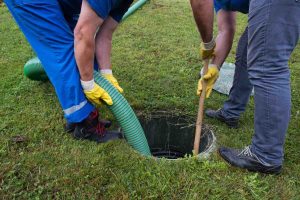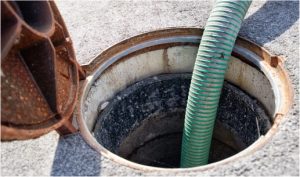Septic Tank Emergencies: What to Do When Your Tank Backs Up
Dealing with a septic tank emergency is nobody’s idea of a good time. One minute, everything’s flowing fine; the next, you’re knee-deep in a mess you didn’t ask for. If your septic tank backs up, don’t panic. It’s not the end of the world, but you’ve got to act fast to avoid making things worse. Let’s break down what you need to do when your tank decides to give you grief.
![{"type":"elementor","siteurl":"https://ejseptics.com.au/wp-json/","elements":[{"id":"6962407","elType":"widget","isInner":false,"isLocked":false,"settings":{"content_width":"full","image":{"url":"https://ejseptics.com.au/wp-content/plugins/elementor/assets/images/placeholder.png","id":"","size":""},"image_size":"large","image_custom_dimension":{"width":"","height":""},"caption_source":"none","caption":"","link_to":"none","link":{"url":"","is_external":"","nofollow":"","custom_attributes":""},"open_lightbox":"default","align":"","align_widescreen":"","align_laptop":"","align_tablet_extra":"","align_tablet":"","align_mobile_extra":"","align_mobile":"","width":{"unit":"%","size":"","sizes":[]},"width_widescreen":{"unit":"px","size":"","sizes":[]},"width_laptop":{"unit":"px","size":"","sizes":[]},"width_tablet_extra":{"unit":"px","size":"","sizes":[]},"width_tablet":{"unit":"%","size":"","sizes":[]},"width_mobile_extra":{"unit":"px","size":"","sizes":[]},"width_mobile":{"unit":"%","size":"","sizes":[]},"space":{"unit":"%","size":"","sizes":[]},"space_widescreen":{"unit":"px","size":"","sizes":[]},"space_laptop":{"unit":"px","size":"","sizes":[]},"space_tablet_extra":{"unit":"px","size":"","sizes":[]},"space_tablet":{"unit":"%","size":"","sizes":[]},"space_mobile_extra":{"unit":"px","size":"","sizes":[]},"space_mobile":{"unit":"%","size":"","sizes":[]},"height":{"unit":"px","size":"","sizes":[]},"height_widescreen":{"unit":"px","size":"","sizes":[]},"height_laptop":{"unit":"px","size":"","sizes":[]},"height_tablet_extra":{"unit":"px","size":"","sizes":[]},"height_tablet":{"unit":"px","size":"","sizes":[]},"height_mobile_extra":{"unit":"px","size":"","sizes":[]},"height_mobile":{"unit":"px","size":"","sizes":[]},"object-fit":"","object-fit_widescreen":"","object-fit_laptop":"","object-fit_tablet_extra":"","object-fit_tablet":"","object-fit_mobile_extra":"","object-fit_mobile":"","object-position":"center center","object-position_widescreen":"","object-position_laptop":"","object-position_tablet_extra":"","object-position_tablet":"","object-position_mobile_extra":"","object-position_mobile":"","opacity":{"unit":"px","size":"","sizes":[]},"css_filters_css_filter":"","css_filters_blur":{"unit":"px","size":0,"sizes":[]},"css_filters_brightness":{"unit":"px","size":100,"sizes":[]},"css_filters_contrast":{"unit":"px","size":100,"sizes":[]},"css_filters_saturate":{"unit":"px","size":100,"sizes":[]},"css_filters_hue":{"unit":"px","size":0,"sizes":[]},"opacity_hover":{"unit":"px","size":"","sizes":[]},"css_filters_hover_css_filter":"","css_filters_hover_blur":{"unit":"px","size":0,"sizes":[]},"css_filters_hover_brightness":{"unit":"px","size":100,"sizes":[]},"css_filters_hover_contrast":{"unit":"px","size":100,"sizes":[]},"css_filters_hover_saturate":{"unit":"px","size":100,"sizes":[]},"css_filters_hover_hue":{"unit":"px","size":0,"sizes":[]},"background_hover_transition":{"unit":"px","size":"","sizes":[]},"hover_animation":"","image_border_border":"","image_border_width":{"unit":"px","top":"","right":"","bottom":"","left":"","isLinked":true},"image_border_width_widescreen":{"unit":"px","top":"","right":"","bottom":"","left":"","isLinked":true},"image_border_width_laptop":{"unit":"px","top":"","right":"","bottom":"","left":"","isLinked":true},"image_border_width_tablet_extra":{"unit":"px","top":"","right":"","bottom":"","left":"","isLinked":true},"image_border_width_tablet":{"unit":"px","top":"","right":"","bottom":"","left":"","isLinked":true},"image_border_width_mobile_extra":{"unit":"px","top":"","right":"","bottom":"","left":"","isLinked":true},"image_border_width_mobile":{"unit":"px","top":"","right":"","bottom":"","left":"","isLinked":true},"image_border_color":"","image_border_radius":{"unit":"px","top":"","right":"","bottom":"","left":"","isLinked":true},"image_border_radius_widescreen":{"unit":"px","top":"","right":"","bottom":"","left":"","isLinked":true},"image_border_radius_laptop":{"unit":"px","top":"","right":"","bottom":"","left":"","isLinked":true},"image_border_radius_tablet_extra":{"unit":"px","top":"","right":"","bottom":"","left":"","isLinked":true},"image_border_radius_tablet":{"unit":"px","top":"","right":"","bottom":"","left":"","isLinked":true},"image_border_radius_mobile_extra":{"unit":"px","top":"","right":"","bottom":"","left":"","isLinked":true},"image_border_radius_mobile":{"unit":"px","top":"","right":"","bottom":"","left":"","isLinked":true},"image_box_shadow_box_shadow_type":"","image_box_shadow_box_shadow":{"horizontal":0,"vertical":0,"blur":10,"spread":0,"color":"rgba(0,0,0,0.5)"},"caption_align":"","caption_align_widescreen":"","caption_align_laptop":"","caption_align_tablet_extra":"","caption_align_tablet":"","caption_align_mobile_extra":"","caption_align_mobile":"","text_color":"","caption_background_color":"","caption_typography_typography":"","caption_typography_font_family":"","caption_typography_font_size":{"unit":"px","size":"","sizes":[]},"caption_typography_font_size_widescreen":{"unit":"px","size":"","sizes":[]},"caption_typography_font_size_laptop":{"unit":"px","size":"","sizes":[]},"caption_typography_font_size_tablet_extra":{"unit":"px","size":"","sizes":[]},"caption_typography_font_size_tablet":{"unit":"px","size":"","sizes":[]},"caption_typography_font_size_mobile_extra":{"unit":"px","size":"","sizes":[]},"caption_typography_font_size_mobile":{"unit":"px","size":"","sizes":[]},"caption_typography_font_weight":"","caption_typography_text_transform":"","caption_typography_font_style":"","caption_typography_text_decoration":"","caption_typography_line_height":{"unit":"px","size":"","sizes":[]},"caption_typography_line_height_widescreen":{"unit":"px","size":"","sizes":[]},"caption_typography_line_height_laptop":{"unit":"px","size":"","sizes":[]},"caption_typography_line_height_tablet_extra":{"unit":"px","size":"","sizes":[]},"caption_typography_line_height_tablet":{"unit":"em","size":"","sizes":[]},"caption_typography_line_height_mobile_extra":{"unit":"px","size":"","sizes":[]},"caption_typography_line_height_mobile":{"unit":"em","size":"","sizes":[]},"caption_typography_letter_spacing":{"unit":"px","size":"","sizes":[]},"caption_typography_letter_spacing_widescreen":{"unit":"px","size":"","sizes":[]},"caption_typography_letter_spacing_laptop":{"unit":"px","size":"","sizes":[]},"caption_typography_letter_spacing_tablet_extra":{"unit":"px","size":"","sizes":[]},"caption_typography_letter_spacing_tablet":{"unit":"px","size":"","sizes":[]},"caption_typography_letter_spacing_mobile_extra":{"unit":"px","size":"","sizes":[]},"caption_typography_letter_spacing_mobile":{"unit":"px","size":"","sizes":[]},"caption_typography_word_spacing":{"unit":"px","size":"","sizes":[]},"caption_typography_word_spacing_widescreen":{"unit":"px","size":"","sizes":[]},"caption_typography_word_spacing_laptop":{"unit":"px","size":"","sizes":[]},"caption_typography_word_spacing_tablet_extra":{"unit":"px","size":"","sizes":[]},"caption_typography_word_spacing_tablet":{"unit":"em","size":"","sizes":[]},"caption_typography_word_spacing_mobile_extra":{"unit":"px","size":"","sizes":[]},"caption_typography_word_spacing_mobile":{"unit":"em","size":"","sizes":[]},"caption_text_shadow_text_shadow_type":"","caption_text_shadow_text_shadow":{"horizontal":0,"vertical":0,"blur":10,"color":"rgba(0,0,0,0.3)"},"caption_space":{"unit":"px","size":"","sizes":[]},"caption_space_widescreen":{"unit":"px","size":"","sizes":[]},"caption_space_laptop":{"unit":"px","size":"","sizes":[]},"caption_space_tablet_extra":{"unit":"px","size":"","sizes":[]},"caption_space_tablet":{"unit":"px","size":"","sizes":[]},"caption_space_mobile_extra":{"unit":"px","size":"","sizes":[]},"caption_space_mobile":{"unit":"px","size":"","sizes":[]},"_title":"","_margin":{"unit":"px","top":"","right":"","bottom":"","left":"","isLinked":true},"_margin_widescreen":{"unit":"px","top":"","right":"","bottom":"","left":"","isLinked":true},"_margin_laptop":{"unit":"px","top":"","right":"","bottom":"","left":"","isLinked":true},"_margin_tablet_extra":{"unit":"px","top":"","right":"","bottom":"","left":"","isLinked":true},"_margin_tablet":{"unit":"px","top":"","right":"","bottom":"","left":"","isLinked":true},"_margin_mobile_extra":{"unit":"px","top":"","right":"","bottom":"","left":"","isLinked":true},"_margin_mobile":{"unit":"px","top":"","right":"","bottom":"","left":"","isLinked":true},"_padding":{"unit":"px","top":"","right":"","bottom":"","left":"","isLinked":true},"_padding_widescreen":{"unit":"px","top":"","right":"","bottom":"","left":"","isLinked":true},"_padding_laptop":{"unit":"px","top":"","right":"","bottom":"","left":"","isLinked":true},"_padding_tablet_extra":{"unit":"px","top":"","right":"","bottom":"","left":"","isLinked":true},"_padding_tablet":{"unit":"px","top":"","right":"","bottom":"","left":"","isLinked":true},"_padding_mobile_extra":{"unit":"px","top":"","right":"","bottom":"","left":"","isLinked":true},"_padding_mobile":{"unit":"px","top":"","right":"","bottom":"","left":"","isLinked":true},"_element_width":"","_element_width_widescreen":"","_element_width_laptop":"","_element_width_tablet_extra":"","_element_width_tablet":"","_element_width_mobile_extra":"","_element_width_mobile":"","_element_custom_width":{"unit":"%","size":"","sizes":[]},"_element_custom_width_widescreen":{"unit":"px","size":"","sizes":[]},"_element_custom_width_laptop":{"unit":"px","size":"","sizes":[]},"_element_custom_width_tablet_extra":{"unit":"px","size":"","sizes":[]},"_element_custom_width_tablet":{"unit":"px","size":"","sizes":[]},"_element_custom_width_mobile_extra":{"unit":"px","size":"","sizes":[]},"_element_custom_width_mobile":{"unit":"px","size":"","sizes":[]},"_flex_align_self":"","_flex_align_self_widescreen":"","_flex_align_self_laptop":"","_flex_align_self_tablet_extra":"","_flex_align_self_tablet":"","_flex_align_self_mobile_extra":"","_flex_align_self_mobile":"","_flex_order":"","_flex_order_widescreen":"","_flex_order_laptop":"","_flex_order_tablet_extra":"","_flex_order_tablet":"","_flex_order_mobile_extra":"","_flex_order_mobile":"","_flex_order_custom":"","_flex_order_custom_widescreen":"","_flex_order_custom_laptop":"","_flex_order_custom_tablet_extra":"","_flex_order_custom_tablet":"","_flex_order_custom_mobile_extra":"","_flex_order_custom_mobile":"","_flex_size":"","_flex_size_widescreen":"","_flex_size_laptop":"","_flex_size_tablet_extra":"","_flex_size_tablet":"","_flex_size_mobile_extra":"","_flex_size_mobile":"","_flex_grow":1,"_flex_grow_widescreen":"","_flex_grow_laptop":"","_flex_grow_tablet_extra":"","_flex_grow_tablet":"","_flex_grow_mobile_extra":"","_flex_grow_mobile":"","_flex_shrink":1,"_flex_shrink_widescreen":"","_flex_shrink_laptop":"","_flex_shrink_tablet_extra":"","_flex_shrink_tablet":"","_flex_shrink_mobile_extra":"","_flex_shrink_mobile":"","_element_vertical_align":"","_element_vertical_align_widescreen":"","_element_vertical_align_laptop":"","_element_vertical_align_tablet_extra":"","_element_vertical_align_tablet":"","_element_vertical_align_mobile_extra":"","_element_vertical_align_mobile":"","_position":"","_offset_orientation_h":"start","_offset_x":{"unit":"px","size":0,"sizes":[]},"_offset_x_widescreen":{"unit":"px","size":"","sizes":[]},"_offset_x_laptop":{"unit":"px","size":"","sizes":[]},"_offset_x_tablet_extra":{"unit":"px","size":"","sizes":[]},"_offset_x_tablet":{"unit":"px","size":"","sizes":[]},"_offset_x_mobile_extra":{"unit":"px","size":"","sizes":[]},"_offset_x_mobile":{"unit":"px","size":"","sizes":[]},"_offset_x_end":{"unit":"px","size":0,"sizes":[]},"_offset_x_end_widescreen":{"unit":"px","size":"","sizes":[]},"_offset_x_end_laptop":{"unit":"px","size":"","sizes":[]},"_offset_x_end_tablet_extra":{"unit":"px","size":"","sizes":[]},"_offset_x_end_tablet":{"unit":"px","size":"","sizes":[]},"_offset_x_end_mobile_extra":{"unit":"px","size":"","sizes":[]},"_offset_x_end_mobile":{"unit":"px","size":"","sizes":[]},"_offset_orientation_v":"start","_offset_y":{"unit":"px","size":0,"sizes":[]},"_offset_y_widescreen":{"unit":"px","size":"","sizes":[]},"_offset_y_laptop":{"unit":"px","size":"","sizes":[]},"_offset_y_tablet_extra":{"unit":"px","size":"","sizes":[]},"_offset_y_tablet":{"unit":"px","size":"","sizes":[]},"_offset_y_mobile_extra":{"unit":"px","size":"","sizes":[]},"_offset_y_mobile":{"unit":"px","size":"","sizes":[]},"_offset_y_end":{"unit":"px","size":0,"sizes":[]},"_offset_y_end_widescreen":{"unit":"px","size":"","sizes":[]},"_offset_y_end_laptop":{"unit":"px","size":"","sizes":[]},"_offset_y_end_tablet_extra":{"unit":"px","size":"","sizes":[]},"_offset_y_end_tablet":{"unit":"px","size":"","sizes":[]},"_offset_y_end_mobile_extra":{"unit":"px","size":"","sizes":[]},"_offset_y_end_mobile":{"unit":"px","size":"","sizes":[]},"_z_index":"","_z_index_widescreen":"","_z_index_laptop":"","_z_index_tablet_extra":"","_z_index_tablet":"","_z_index_mobile_extra":"","_z_index_mobile":"","_element_id":"","_css_classes":"","e_display_conditions":"","ha_floating_fx":"","ha_floating_fx_translate_toggle":"","ha_floating_fx_translate_x":{"unit":"px","size":"","sizes":{"from":0,"to":5}},"ha_floating_fx_translate_y":{"unit":"px","size":"","sizes":{"from":0,"to":5}},"ha_floating_fx_translate_duration":{"unit":"px","size":1000,"sizes":[]},"ha_floating_fx_translate_delay":{"unit":"px","size":"","sizes":[]},"ha_floating_fx_rotate_toggle":"","ha_floating_fx_rotate_x":{"unit":"px","size":"","sizes":{"from":0,"to":45}},"ha_floating_fx_rotate_y":{"unit":"px","size":"","sizes":{"from":0,"to":45}},"ha_floating_fx_rotate_z":{"unit":"px","size":"","sizes":{"from":0,"to":45}},"ha_floating_fx_rotate_duration":{"unit":"px","size":1000,"sizes":[]},"ha_floating_fx_rotate_delay":{"unit":"px","size":"","sizes":[]},"ha_floating_fx_scale_toggle":"","ha_floating_fx_scale_x":{"unit":"px","size":"","sizes":{"from":1,"to":1.2}},"ha_floating_fx_scale_y":{"unit":"px","size":"","sizes":{"from":1,"to":1.2}},"ha_floating_fx_scale_duration":{"unit":"px","size":1000,"sizes":[]},"ha_floating_fx_scale_delay":{"unit":"px","size":"","sizes":[]},"ha_element_link":{"url":"","is_external":"","nofollow":"","custom_attributes":""},"ha_transform_fx":"","ha_transform_fx_translate_toggle":"","ha_transform_fx_translate_x":{"unit":"px","size":"","sizes":[]},"ha_transform_fx_translate_x_widescreen":{"unit":"px","size":"","sizes":[]},"ha_transform_fx_translate_x_laptop":{"unit":"px","size":"","sizes":[]},"ha_transform_fx_translate_x_tablet_extra":{"unit":"px","size":"","sizes":[]},"ha_transform_fx_translate_x_tablet":{"unit":"px","size":"","sizes":[]},"ha_transform_fx_translate_x_mobile_extra":{"unit":"px","size":"","sizes":[]},"ha_transform_fx_translate_x_mobile":{"unit":"px","size":"","sizes":[]},"ha_transform_fx_translate_y":{"unit":"px","size":"","sizes":[]},"ha_transform_fx_translate_y_widescreen":{"unit":"px","size":"","sizes":[]},"ha_transform_fx_translate_y_laptop":{"unit":"px","size":"","sizes":[]},"ha_transform_fx_translate_y_tablet_extra":{"unit":"px","size":"","sizes":[]},"ha_transform_fx_translate_y_tablet":{"unit":"px","size":"","sizes":[]},"ha_transform_fx_translate_y_mobile_extra":{"unit":"px","size":"","sizes":[]},"ha_transform_fx_translate_y_mobile":{"unit":"px","size":"","sizes":[]},"ha_transform_fx_rotate_toggle":"","ha_transform_fx_rotate_mode":"loose","ha_transform_fx_rotate_x":{"unit":"px","size":"","sizes":[]},"ha_transform_fx_rotate_x_widescreen":{"unit":"px","size":"","sizes":[]},"ha_transform_fx_rotate_x_laptop":{"unit":"px","size":"","sizes":[]},"ha_transform_fx_rotate_x_tablet_extra":{"unit":"px","size":"","sizes":[]},"ha_transform_fx_rotate_x_tablet":{"unit":"px","size":"","sizes":[]},"ha_transform_fx_rotate_x_mobile_extra":{"unit":"px","size":"","sizes":[]},"ha_transform_fx_rotate_x_mobile":{"unit":"px","size":"","sizes":[]},"ha_transform_fx_rotate_y":{"unit":"px","size":"","sizes":[]},"ha_transform_fx_rotate_y_widescreen":{"unit":"px","size":"","sizes":[]},"ha_transform_fx_rotate_y_laptop":{"unit":"px","size":"","sizes":[]},"ha_transform_fx_rotate_y_tablet_extra":{"unit":"px","size":"","sizes":[]},"ha_transform_fx_rotate_y_tablet":{"unit":"px","size":"","sizes":[]},"ha_transform_fx_rotate_y_mobile_extra":{"unit":"px","size":"","sizes":[]},"ha_transform_fx_rotate_y_mobile":{"unit":"px","size":"","sizes":[]},"ha_transform_fx_rotate_z":{"unit":"px","size":"","sizes":[]},"ha_transform_fx_rotate_z_widescreen":{"unit":"px","size":"","sizes":[]},"ha_transform_fx_rotate_z_laptop":{"unit":"px","size":"","sizes":[]},"ha_transform_fx_rotate_z_tablet_extra":{"unit":"px","size":"","sizes":[]},"ha_transform_fx_rotate_z_tablet":{"unit":"px","size":"","sizes":[]},"ha_transform_fx_rotate_z_mobile_extra":{"unit":"px","size":"","sizes":[]},"ha_transform_fx_rotate_z_mobile":{"unit":"px","size":"","sizes":[]},"ha_transform_fx_scale_toggle":"","ha_transform_fx_scale_mode":"loose","ha_transform_fx_scale_x":{"unit":"px","size":1,"sizes":[]},"ha_transform_fx_scale_x_widescreen":{"unit":"px","size":"","sizes":[]},"ha_transform_fx_scale_x_laptop":{"unit":"px","size":"","sizes":[]},"ha_transform_fx_scale_x_tablet_extra":{"unit":"px","size":"","sizes":[]},"ha_transform_fx_scale_x_tablet":{"unit":"px","size":"","sizes":[]},"ha_transform_fx_scale_x_mobile_extra":{"unit":"px","size":"","sizes":[]},"ha_transform_fx_scale_x_mobile":{"unit":"px","size":"","sizes":[]},"ha_transform_fx_scale_y":{"unit":"px","size":1,"sizes":[]},"ha_transform_fx_scale_y_widescreen":{"unit":"px","size":"","sizes":[]},"ha_transform_fx_scale_y_laptop":{"unit":"px","size":"","sizes":[]},"ha_transform_fx_scale_y_tablet_extra":{"unit":"px","size":"","sizes":[]},"ha_transform_fx_scale_y_tablet":{"unit":"px","size":"","sizes":[]},"ha_transform_fx_scale_y_mobile_extra":{"unit":"px","size":"","sizes":[]},"ha_transform_fx_scale_y_mobile":{"unit":"px","size":"","sizes":[]},"ha_transform_fx_skew_toggle":"","ha_transform_fx_skew_x":{"unit":"px","size":"","sizes":[]},"ha_transform_fx_skew_x_widescreen":{"unit":"px","size":"","sizes":[]},"ha_transform_fx_skew_x_laptop":{"unit":"px","size":"","sizes":[]},"ha_transform_fx_skew_x_tablet_extra":{"unit":"px","size":"","sizes":[]},"ha_transform_fx_skew_x_tablet":{"unit":"px","size":"","sizes":[]},"ha_transform_fx_skew_x_mobile_extra":{"unit":"px","size":"","sizes":[]},"ha_transform_fx_skew_x_mobile":{"unit":"px","size":"","sizes":[]},"ha_transform_fx_skew_y":{"unit":"px","size":"","sizes":[]},"ha_transform_fx_skew_y_widescreen":{"unit":"px","size":"","sizes":[]},"ha_transform_fx_skew_y_laptop":{"unit":"px","size":"","sizes":[]},"ha_transform_fx_skew_y_tablet_extra":{"unit":"px","size":"","sizes":[]},"ha_transform_fx_skew_y_tablet":{"unit":"px","size":"","sizes":[]},"ha_transform_fx_skew_y_mobile_extra":{"unit":"px","size":"","sizes":[]},"ha_transform_fx_skew_y_mobile":{"unit":"px","size":"","sizes":[]},"ha_transform_fx_translate_toggle_hover":"","ha_transform_fx_translate_x_hover":{"unit":"px","size":"","sizes":[]},"ha_transform_fx_translate_x_hover_widescreen":{"unit":"px","size":"","sizes":[]},"ha_transform_fx_translate_x_hover_laptop":{"unit":"px","size":"","sizes":[]},"ha_transform_fx_translate_x_hover_tablet_extra":{"unit":"px","size":"","sizes":[]},"ha_transform_fx_translate_x_hover_tablet":{"unit":"px","size":"","sizes":[]},"ha_transform_fx_translate_x_hover_mobile_extra":{"unit":"px","size":"","sizes":[]},"ha_transform_fx_translate_x_hover_mobile":{"unit":"px","size":"","sizes":[]},"ha_transform_fx_translate_y_hover":{"unit":"px","size":"","sizes":[]},"ha_transform_fx_translate_y_hover_widescreen":{"unit":"px","size":"","sizes":[]},"ha_transform_fx_translate_y_hover_laptop":{"unit":"px","size":"","sizes":[]},"ha_transform_fx_translate_y_hover_tablet_extra":{"unit":"px","size":"","sizes":[]},"ha_transform_fx_translate_y_hover_tablet":{"unit":"px","size":"","sizes":[]},"ha_transform_fx_translate_y_hover_mobile_extra":{"unit":"px","size":"","sizes":[]},"ha_transform_fx_translate_y_hover_mobile":{"unit":"px","size":"","sizes":[]},"ha_transform_fx_rotate_toggle_hover":"","ha_transform_fx_rotate_mode_hover":"loose","ha_transform_fx_rotate_x_hover":{"unit":"px","size":"","sizes":[]},"ha_transform_fx_rotate_x_hover_widescreen":{"unit":"px","size":"","sizes":[]},"ha_transform_fx_rotate_x_hover_laptop":{"unit":"px","size":"","sizes":[]},"ha_transform_fx_rotate_x_hover_tablet_extra":{"unit":"px","size":"","sizes":[]},"ha_transform_fx_rotate_x_hover_tablet":{"unit":"px","size":"","sizes":[]},"ha_transform_fx_rotate_x_hover_mobile_extra":{"unit":"px","size":"","sizes":[]},"ha_transform_fx_rotate_x_hover_mobile":{"unit":"px","size":"","sizes":[]},"ha_transform_fx_rotate_y_hover":{"unit":"px","size":"","sizes":[]},"ha_transform_fx_rotate_y_hover_widescreen":{"unit":"px","size":"","sizes":[]},"ha_transform_fx_rotate_y_hover_laptop":{"unit":"px","size":"","sizes":[]},"ha_transform_fx_rotate_y_hover_tablet_extra":{"unit":"px","size":"","sizes":[]},"ha_transform_fx_rotate_y_hover_tablet":{"unit":"px","size":"","sizes":[]},"ha_transform_fx_rotate_y_hover_mobile_extra":{"unit":"px","size":"","sizes":[]},"ha_transform_fx_rotate_y_hover_mobile":{"unit":"px","size":"","sizes":[]},"ha_transform_fx_rotate_z_hover":{"unit":"px","size":"","sizes":[]},"ha_transform_fx_rotate_z_hover_widescreen":{"unit":"px","size":"","sizes":[]},"ha_transform_fx_rotate_z_hover_laptop":{"unit":"px","size":"","sizes":[]},"ha_transform_fx_rotate_z_hover_tablet_extra":{"unit":"px","size":"","sizes":[]},"ha_transform_fx_rotate_z_hover_tablet":{"unit":"px","size":"","sizes":[]},"ha_transform_fx_rotate_z_hover_mobile_extra":{"unit":"px","size":"","sizes":[]},"ha_transform_fx_rotate_z_hover_mobile":{"unit":"px","size":"","sizes":[]},"ha_transform_fx_scale_toggle_hover":"","ha_transform_fx_scale_mode_hover":"loose","ha_transform_fx_scale_x_hover":{"unit":"px","size":1,"sizes":[]},"ha_transform_fx_scale_x_hover_widescreen":{"unit":"px","size":"","sizes":[]},"ha_transform_fx_scale_x_hover_laptop":{"unit":"px","size":"","sizes":[]},"ha_transform_fx_scale_x_hover_tablet_extra":{"unit":"px","size":"","sizes":[]},"ha_transform_fx_scale_x_hover_tablet":{"unit":"px","size":"","sizes":[]},"ha_transform_fx_scale_x_hover_mobile_extra":{"unit":"px","size":"","sizes":[]},"ha_transform_fx_scale_x_hover_mobile":{"unit":"px","size":"","sizes":[]},"ha_transform_fx_scale_y_hover":{"unit":"px","size":1,"sizes":[]},"ha_transform_fx_scale_y_hover_widescreen":{"unit":"px","size":"","sizes":[]},"ha_transform_fx_scale_y_hover_laptop":{"unit":"px","size":"","sizes":[]},"ha_transform_fx_scale_y_hover_tablet_extra":{"unit":"px","size":"","sizes":[]},"ha_transform_fx_scale_y_hover_tablet":{"unit":"px","size":"","sizes":[]},"ha_transform_fx_scale_y_hover_mobile_extra":{"unit":"px","size":"","sizes":[]},"ha_transform_fx_scale_y_hover_mobile":{"unit":"px","size":"","sizes":[]},"ha_transform_fx_skew_toggle_hover":"","ha_transform_fx_skew_x_hover":{"unit":"px","size":"","sizes":[]},"ha_transform_fx_skew_x_hover_widescreen":{"unit":"px","size":"","sizes":[]},"ha_transform_fx_skew_x_hover_laptop":{"unit":"px","size":"","sizes":[]},"ha_transform_fx_skew_x_hover_tablet_extra":{"unit":"px","size":"","sizes":[]},"ha_transform_fx_skew_x_hover_tablet":{"unit":"px","size":"","sizes":[]},"ha_transform_fx_skew_x_hover_mobile_extra":{"unit":"px","size":"","sizes":[]},"ha_transform_fx_skew_x_hover_mobile":{"unit":"px","size":"","sizes":[]},"ha_transform_fx_skew_y_hover":{"unit":"px","size":"","sizes":[]},"ha_transform_fx_skew_y_hover_widescreen":{"unit":"px","size":"","sizes":[]},"ha_transform_fx_skew_y_hover_laptop":{"unit":"px","size":"","sizes":[]},"ha_transform_fx_skew_y_hover_tablet_extra":{"unit":"px","size":"","sizes":[]},"ha_transform_fx_skew_y_hover_tablet":{"unit":"px","size":"","sizes":[]},"ha_transform_fx_skew_y_hover_mobile_extra":{"unit":"px","size":"","sizes":[]},"ha_transform_fx_skew_y_hover_mobile":{"unit":"px","size":"","sizes":[]},"ha_transform_fx_transition_duration":{"unit":"px","size":"","sizes":[]},"eael_wrapper_link_switch":"","eael_wrapper_link":{"url":"","is_external":"","nofollow":"","custom_attributes":""},"eael_hover_effect_switch":"","eael_hover_effect_enable_live_changes":"","eael_hover_effect_opacity_popover":"","eael_hover_effect_opacity":{"unit":"px","size":0.8,"sizes":[]},"eael_hover_effect_filter_popover":"","eael_hover_effect_blur_is_on":"","eael_hover_effect_blur":{"unit":"px","size":1,"sizes":[]},"eael_hover_effect_contrast_is_on":"","eael_hover_effect_contrast":{"unit":"px","size":80,"sizes":[]},"eael_hover_effect_grayscale_is_on":"","eael_hover_effect_grayscal":{"unit":"px","size":40,"sizes":[]},"eael_hover_effect_invert_is_on":"","eael_hover_effect_invert":{"unit":"px","size":70,"sizes":[]},"eael_hover_effect_saturate_is_on":"","eael_hover_effect_saturate":{"unit":"px","size":50,"sizes":[]},"eael_hover_effect_sepia_is_on":"","eael_hover_effect_sepia":{"unit":"px","size":50,"sizes":[]},"eael_hover_effect_offset_popover":"","eael_hover_effect_offset_left":{"unit":"px","size":5,"sizes":[]},"eael_hover_effect_offset_left_widescreen":{"unit":"px","size":"","sizes":[]},"eael_hover_effect_offset_left_laptop":{"unit":"px","size":"","sizes":[]},"eael_hover_effect_offset_left_tablet_extra":{"unit":"px","size":"","sizes":[]},"eael_hover_effect_offset_left_tablet":{"unit":"px","size":"","sizes":[]},"eael_hover_effect_offset_left_mobile_extra":{"unit":"px","size":"","sizes":[]},"eael_hover_effect_offset_left_mobile":{"unit":"px","size":"","sizes":[]},"eael_hover_effect_offset_top":{"unit":"px","size":5,"sizes":[]},"eael_hover_effect_offset_top_widescreen":{"unit":"px","size":"","sizes":[]},"eael_hover_effect_offset_top_laptop":{"unit":"px","size":"","sizes":[]},"eael_hover_effect_offset_top_tablet_extra":{"unit":"px","size":"","sizes":[]},"eael_hover_effect_offset_top_tablet":{"unit":"px","size":"","sizes":[]},"eael_hover_effect_offset_top_mobile_extra":{"unit":"px","size":"","sizes":[]},"eael_hover_effect_offset_top_mobile":{"unit":"px","size":"","sizes":[]},"eael_hover_effect_transform_popover":"","eael_hover_effect_rotate_is_on":"","eael_hover_effect_transform_rotatex":{"unit":"px","size":0,"sizes":[]},"eael_hover_effect_transform_rotatex_widescreen":{"unit":"px","size":"","sizes":[]},"eael_hover_effect_transform_rotatex_laptop":{"unit":"px","size":"","sizes":[]},"eael_hover_effect_transform_rotatex_tablet_extra":{"unit":"px","size":"","sizes":[]},"eael_hover_effect_transform_rotatex_tablet":{"unit":"px","size":"","sizes":[]},"eael_hover_effect_transform_rotatex_mobile_extra":{"unit":"px","size":"","sizes":[]},"eael_hover_effect_transform_rotatex_mobile":{"unit":"px","size":"","sizes":[]},"eael_hover_effect_transform_rotatey":{"unit":"px","size":0,"sizes":[]},"eael_hover_effect_transform_rotatey_widescreen":{"unit":"px","size":"","sizes":[]},"eael_hover_effect_transform_rotatey_laptop":{"unit":"px","size":"","sizes":[]},"eael_hover_effect_transform_rotatey_tablet_extra":{"unit":"px","size":"","sizes":[]},"eael_hover_effect_transform_rotatey_tablet":{"unit":"px","size":"","sizes":[]},"eael_hover_effect_transform_rotatey_mobile_extra":{"unit":"px","size":"","sizes":[]},"eael_hover_effect_transform_rotatey_mobile":{"unit":"px","size":"","sizes":[]},"eael_hover_effect_transform_rotatez":{"unit":"px","size":5,"sizes":[]},"eael_hover_effect_transform_rotatez_widescreen":{"unit":"px","size":"","sizes":[]},"eael_hover_effect_transform_rotatez_laptop":{"unit":"px","size":"","sizes":[]},"eael_hover_effect_transform_rotatez_tablet_extra":{"unit":"px","size":"","sizes":[]},"eael_hover_effect_transform_rotatez_tablet":{"unit":"px","size":"","sizes":[]},"eael_hover_effect_transform_rotatez_mobile_extra":{"unit":"px","size":"","sizes":[]},"eael_hover_effect_transform_rotatez_mobile":{"unit":"px","size":"","sizes":[]},"eael_hover_effect_scale_is_on":"","eael_hover_effect_transform_scalex":{"unit":"px","size":0.9,"sizes":[]},"eael_hover_effect_transform_scalex_widescreen":{"unit":"px","size":"","sizes":[]},"eael_hover_effect_transform_scalex_laptop":{"unit":"px","size":"","sizes":[]},"eael_hover_effect_transform_scalex_tablet_extra":{"unit":"px","size":"","sizes":[]},"eael_hover_effect_transform_scalex_tablet":{"unit":"px","size":"","sizes":[]},"eael_hover_effect_transform_scalex_mobile_extra":{"unit":"px","size":"","sizes":[]},"eael_hover_effect_transform_scalex_mobile":{"unit":"px","size":"","sizes":[]},"eael_hover_effect_transform_scaley":{"unit":"px","size":0.9,"sizes":[]},"eael_hover_effect_transform_scaley_widescreen":{"unit":"px","size":"","sizes":[]},"eael_hover_effect_transform_scaley_laptop":{"unit":"px","size":"","sizes":[]},"eael_hover_effect_transform_scaley_tablet_extra":{"unit":"px","size":"","sizes":[]},"eael_hover_effect_transform_scaley_tablet":{"unit":"px","size":"","sizes":[]},"eael_hover_effect_transform_scaley_mobile_extra":{"unit":"px","size":"","sizes":[]},"eael_hover_effect_transform_scaley_mobile":{"unit":"px","size":"","sizes":[]},"eael_hover_effect_skew_is_on":"","eael_hover_effect_transform_skewx":{"unit":"px","size":5,"sizes":[]},"eael_hover_effect_transform_skewx_widescreen":{"unit":"px","size":"","sizes":[]},"eael_hover_effect_transform_skewx_laptop":{"unit":"px","size":"","sizes":[]},"eael_hover_effect_transform_skewx_tablet_extra":{"unit":"px","size":"","sizes":[]},"eael_hover_effect_transform_skewx_tablet":{"unit":"px","size":"","sizes":[]},"eael_hover_effect_transform_skewx_mobile_extra":{"unit":"px","size":"","sizes":[]},"eael_hover_effect_transform_skewx_mobile":{"unit":"px","size":"","sizes":[]},"eael_hover_effect_transform_skewy":{"unit":"px","size":5,"sizes":[]},"eael_hover_effect_transform_skewy_widescreen":{"unit":"px","size":"","sizes":[]},"eael_hover_effect_transform_skewy_laptop":{"unit":"px","size":"","sizes":[]},"eael_hover_effect_transform_skewy_tablet_extra":{"unit":"px","size":"","sizes":[]},"eael_hover_effect_transform_skewy_tablet":{"unit":"px","size":"","sizes":[]},"eael_hover_effect_transform_skewy_mobile_extra":{"unit":"px","size":"","sizes":[]},"eael_hover_effect_transform_skewy_mobile":{"unit":"px","size":"","sizes":[]},"eael_hover_effect_general_settings_duration":{"unit":"px","size":1000,"sizes":[]},"eael_hover_effect_general_settings_delay":{"unit":"px","size":"","sizes":[]},"eael_hover_effect_general_settings_easing":"ease","eael_hover_effect_opacity_popover_hover":"","eael_hover_effect_opacity_hover":{"unit":"px","size":1,"sizes":[]},"eael_hover_effect_filter_hover_popover":"","eael_hover_effect_blur_hover_is_on":"","eael_hover_effect_blur_hover":{"unit":"px","size":0,"sizes":[]},"eael_hover_effect_contrast_hover_is_on":"","eael_hover_effect_contrast_hover":{"unit":"%","size":100,"sizes":[]},"eael_hover_effect_grayscale_hover_is_on":"","eael_hover_effect_grayscal_hover":{"unit":"%","size":0,"sizes":[]},"eael_hover_effect_invert_hover_is_on":"","eael_hover_effect_invert_hover":{"unit":"%","size":0,"sizes":[]},"eael_hover_effect_saturate_hover_is_on":"","eael_hover_effect_saturate_hover":{"unit":"%","size":100,"sizes":[]},"eael_hover_effect_sepia_hover_is_on":"","eael_hover_effect_sepia_hover":{"unit":"px","size":1,"sizes":[]},"eael_hover_effect_offset_hover_popover":"","eael_hover_effect_offset_hover_left":{"unit":"px","size":0,"sizes":[]},"eael_hover_effect_offset_hover_left_widescreen":{"unit":"px","size":"","sizes":[]},"eael_hover_effect_offset_hover_left_laptop":{"unit":"px","size":"","sizes":[]},"eael_hover_effect_offset_hover_left_tablet_extra":{"unit":"px","size":"","sizes":[]},"eael_hover_effect_offset_hover_left_tablet":{"unit":"px","size":"","sizes":[]},"eael_hover_effect_offset_hover_left_mobile_extra":{"unit":"px","size":"","sizes":[]},"eael_hover_effect_offset_hover_left_mobile":{"unit":"px","size":"","sizes":[]},"eael_hover_effect_offset_hover_top":{"unit":"px","size":0,"sizes":[]},"eael_hover_effect_offset_hover_top_widescreen":{"unit":"px","size":"","sizes":[]},"eael_hover_effect_offset_hover_top_laptop":{"unit":"px","size":"","sizes":[]},"eael_hover_effect_offset_hover_top_tablet_extra":{"unit":"px","size":"","sizes":[]},"eael_hover_effect_offset_hover_top_tablet":{"unit":"px","size":"","sizes":[]},"eael_hover_effect_offset_hover_top_mobile_extra":{"unit":"px","size":"","sizes":[]},"eael_hover_effect_offset_hover_top_mobile":{"unit":"px","size":"","sizes":[]},"eael_hover_effect_transform_hover_popover":"","eael_hover_effect_rotate_hover_is_on":"","eael_hover_effect_transform_hover_rotatex":{"unit":"px","size":0,"sizes":[]},"eael_hover_effect_transform_hover_rotatex_widescreen":{"unit":"px","size":"","sizes":[]},"eael_hover_effect_transform_hover_rotatex_laptop":{"unit":"px","size":"","sizes":[]},"eael_hover_effect_transform_hover_rotatex_tablet_extra":{"unit":"px","size":"","sizes":[]},"eael_hover_effect_transform_hover_rotatex_tablet":{"unit":"px","size":"","sizes":[]},"eael_hover_effect_transform_hover_rotatex_mobile_extra":{"unit":"px","size":"","sizes":[]},"eael_hover_effect_transform_hover_rotatex_mobile":{"unit":"px","size":"","sizes":[]},"eael_hover_effect_transform_hover_rotatey":{"unit":"px","size":0,"sizes":[]},"eael_hover_effect_transform_hover_rotatey_widescreen":{"unit":"px","size":"","sizes":[]},"eael_hover_effect_transform_hover_rotatey_laptop":{"unit":"px","size":"","sizes":[]},"eael_hover_effect_transform_hover_rotatey_tablet_extra":{"unit":"px","size":"","sizes":[]},"eael_hover_effect_transform_hover_rotatey_tablet":{"unit":"px","size":"","sizes":[]},"eael_hover_effect_transform_hover_rotatey_mobile_extra":{"unit":"px","size":"","sizes":[]},"eael_hover_effect_transform_hover_rotatey_mobile":{"unit":"px","size":"","sizes":[]},"eael_hover_effect_transform_hover_rotatez":{"unit":"px","size":0,"sizes":[]},"eael_hover_effect_transform_hover_rotatez_widescreen":{"unit":"px","size":"","sizes":[]},"eael_hover_effect_transform_hover_rotatez_laptop":{"unit":"px","size":"","sizes":[]},"eael_hover_effect_transform_hover_rotatez_tablet_extra":{"unit":"px","size":"","sizes":[]},"eael_hover_effect_transform_hover_rotatez_tablet":{"unit":"px","size":"","sizes":[]},"eael_hover_effect_transform_hover_rotatez_mobile_extra":{"unit":"px","size":"","sizes":[]},"eael_hover_effect_transform_hover_rotatez_mobile":{"unit":"px","size":"","sizes":[]},"eael_hover_effect_scale_hover_is_on":"","eael_hover_effect_transform_hover_scalex":{"unit":"px","size":1,"sizes":[]},"eael_hover_effect_transform_hover_scalex_widescreen":{"unit":"px","size":"","sizes":[]},"eael_hover_effect_transform_hover_scalex_laptop":{"unit":"px","size":"","sizes":[]},"eael_hover_effect_transform_hover_scalex_tablet_extra":{"unit":"px","size":"","sizes":[]},"eael_hover_effect_transform_hover_scalex_tablet":{"unit":"px","size":"","sizes":[]},"eael_hover_effect_transform_hover_scalex_mobile_extra":{"unit":"px","size":"","sizes":[]},"eael_hover_effect_transform_hover_scalex_mobile":{"unit":"px","size":"","sizes":[]},"eael_hover_effect_transform_hover_scaley":{"unit":"px","size":0,"sizes":[]},"eael_hover_effect_transform_hover_scaley_widescreen":{"unit":"px","size":"","sizes":[]},"eael_hover_effect_transform_hover_scaley_laptop":{"unit":"px","size":"","sizes":[]},"eael_hover_effect_transform_hover_scaley_tablet_extra":{"unit":"px","size":"","sizes":[]},"eael_hover_effect_transform_hover_scaley_tablet":{"unit":"px","size":"","sizes":[]},"eael_hover_effect_transform_hover_scaley_mobile_extra":{"unit":"px","size":"","sizes":[]},"eael_hover_effect_transform_hover_scaley_mobile":{"unit":"px","size":"","sizes":[]},"eael_hover_effect_skew_hover_is_on":"","eael_hover_effect_transform_hover_skewx":{"unit":"px","size":0,"sizes":[]},"eael_hover_effect_transform_hover_skewx_widescreen":{"unit":"px","size":"","sizes":[]},"eael_hover_effect_transform_hover_skewx_laptop":{"unit":"px","size":"","sizes":[]},"eael_hover_effect_transform_hover_skewx_tablet_extra":{"unit":"px","size":"","sizes":[]},"eael_hover_effect_transform_hover_skewx_tablet":{"unit":"px","size":"","sizes":[]},"eael_hover_effect_transform_hover_skewx_mobile_extra":{"unit":"px","size":"","sizes":[]},"eael_hover_effect_transform_hover_skewx_mobile":{"unit":"px","size":"","sizes":[]},"eael_hover_effect_transform_hover_skewy":{"unit":"px","size":0,"sizes":[]},"eael_hover_effect_transform_hover_skewy_widescreen":{"unit":"px","size":"","sizes":[]},"eael_hover_effect_transform_hover_skewy_laptop":{"unit":"px","size":"","sizes":[]},"eael_hover_effect_transform_hover_skewy_tablet_extra":{"unit":"px","size":"","sizes":[]},"eael_hover_effect_transform_hover_skewy_tablet":{"unit":"px","size":"","sizes":[]},"eael_hover_effect_transform_hover_skewy_mobile_extra":{"unit":"px","size":"","sizes":[]},"eael_hover_effect_transform_hover_skewy_mobile":{"unit":"px","size":"","sizes":[]},"eael_hover_effect_general_settings_hover_duration":{"unit":"px","size":1000,"sizes":[]},"eael_hover_effect_general_settings_hover_delay":{"unit":"px","size":"","sizes":[]},"eael_hover_effect_general_settings_hover_easing":"ease","eael_hover_effect_hover_tilt":"","motion_fx_motion_fx_scrolling":"","motion_fx_translateY_effect":"","motion_fx_translateY_direction":"","motion_fx_translateY_speed":{"unit":"px","size":4,"sizes":[]},"motion_fx_translateY_affectedRange":{"unit":"%","size":"","sizes":{"start":0,"end":100}},"motion_fx_translateX_effect":"","motion_fx_translateX_direction":"","motion_fx_translateX_speed":{"unit":"px","size":4,"sizes":[]},"motion_fx_translateX_affectedRange":{"unit":"%","size":"","sizes":{"start":0,"end":100}},"motion_fx_opacity_effect":"","motion_fx_opacity_direction":"out-in","motion_fx_opacity_level":{"unit":"px","size":10,"sizes":[]},"motion_fx_opacity_range":{"unit":"%","size":"","sizes":{"start":20,"end":80}},"motion_fx_blur_effect":"","motion_fx_blur_direction":"out-in","motion_fx_blur_level":{"unit":"px","size":7,"sizes":[]},"motion_fx_blur_range":{"unit":"%","size":"","sizes":{"start":20,"end":80}},"motion_fx_rotateZ_effect":"","motion_fx_rotateZ_direction":"","motion_fx_rotateZ_speed":{"unit":"px","size":1,"sizes":[]},"motion_fx_rotateZ_affectedRange":{"unit":"%","size":"","sizes":{"start":0,"end":100}},"motion_fx_scale_effect":"","motion_fx_scale_direction":"out-in","motion_fx_scale_speed":{"unit":"px","size":4,"sizes":[]},"motion_fx_scale_range":{"unit":"%","size":"","sizes":{"start":20,"end":80}},"motion_fx_transform_origin_x":"center","motion_fx_transform_origin_y":"center","motion_fx_devices":["widescreen","desktop","laptop","tablet_extra","tablet","mobile_extra","mobile"],"motion_fx_range":"","motion_fx_motion_fx_mouse":"","motion_fx_mouseTrack_effect":"","motion_fx_mouseTrack_direction":"","motion_fx_mouseTrack_speed":{"unit":"px","size":1,"sizes":[]},"motion_fx_tilt_effect":"","motion_fx_tilt_direction":"","motion_fx_tilt_speed":{"unit":"px","size":4,"sizes":[]},"sticky":"","sticky_on":["widescreen","desktop","laptop","tablet_extra","tablet","mobile_extra","mobile"],"sticky_offset":0,"sticky_offset_widescreen":"","sticky_offset_laptop":"","sticky_offset_tablet_extra":"","sticky_offset_tablet":"","sticky_offset_mobile_extra":"","sticky_offset_mobile":"","sticky_effects_offset":0,"sticky_effects_offset_widescreen":"","sticky_effects_offset_laptop":"","sticky_effects_offset_tablet_extra":"","sticky_effects_offset_tablet":"","sticky_effects_offset_mobile_extra":"","sticky_effects_offset_mobile":"","sticky_parent":"","_animation":"","_animation_widescreen":"","_animation_laptop":"","_animation_tablet_extra":"","_animation_tablet":"","_animation_mobile_extra":"","_animation_mobile":"","animation_duration":"","_animation_delay":"","_transform_rotate_popover":"","_transform_rotateZ_effect":{"unit":"px","size":"","sizes":[]},"_transform_rotateZ_effect_widescreen":{"unit":"deg","size":"","sizes":[]},"_transform_rotateZ_effect_laptop":{"unit":"deg","size":"","sizes":[]},"_transform_rotateZ_effect_tablet_extra":{"unit":"deg","size":"","sizes":[]},"_transform_rotateZ_effect_tablet":{"unit":"deg","size":"","sizes":[]},"_transform_rotateZ_effect_mobile_extra":{"unit":"deg","size":"","sizes":[]},"_transform_rotateZ_effect_mobile":{"unit":"deg","size":"","sizes":[]},"_transform_rotate_3d":"","_transform_rotateX_effect":{"unit":"px","size":"","sizes":[]},"_transform_rotateX_effect_widescreen":{"unit":"deg","size":"","sizes":[]},"_transform_rotateX_effect_laptop":{"unit":"deg","size":"","sizes":[]},"_transform_rotateX_effect_tablet_extra":{"unit":"deg","size":"","sizes":[]},"_transform_rotateX_effect_tablet":{"unit":"deg","size":"","sizes":[]},"_transform_rotateX_effect_mobile_extra":{"unit":"deg","size":"","sizes":[]},"_transform_rotateX_effect_mobile":{"unit":"deg","size":"","sizes":[]},"_transform_rotateY_effect":{"unit":"px","size":"","sizes":[]},"_transform_rotateY_effect_widescreen":{"unit":"deg","size":"","sizes":[]},"_transform_rotateY_effect_laptop":{"unit":"deg","size":"","sizes":[]},"_transform_rotateY_effect_tablet_extra":{"unit":"deg","size":"","sizes":[]},"_transform_rotateY_effect_tablet":{"unit":"deg","size":"","sizes":[]},"_transform_rotateY_effect_mobile_extra":{"unit":"deg","size":"","sizes":[]},"_transform_rotateY_effect_mobile":{"unit":"deg","size":"","sizes":[]},"_transform_perspective_effect":{"unit":"px","size":"","sizes":[]},"_transform_perspective_effect_widescreen":{"unit":"px","size":"","sizes":[]},"_transform_perspective_effect_laptop":{"unit":"px","size":"","sizes":[]},"_transform_perspective_effect_tablet_extra":{"unit":"px","size":"","sizes":[]},"_transform_perspective_effect_tablet":{"unit":"px","size":"","sizes":[]},"_transform_perspective_effect_mobile_extra":{"unit":"px","size":"","sizes":[]},"_transform_perspective_effect_mobile":{"unit":"px","size":"","sizes":[]},"_transform_translate_popover":"","_transform_translateX_effect":{"unit":"px","size":"","sizes":[]},"_transform_translateX_effect_widescreen":{"unit":"px","size":"","sizes":[]},"_transform_translateX_effect_laptop":{"unit":"px","size":"","sizes":[]},"_transform_translateX_effect_tablet_extra":{"unit":"px","size":"","sizes":[]},"_transform_translateX_effect_tablet":{"unit":"px","size":"","sizes":[]},"_transform_translateX_effect_mobile_extra":{"unit":"px","size":"","sizes":[]},"_transform_translateX_effect_mobile":{"unit":"px","size":"","sizes":[]},"_transform_translateY_effect":{"unit":"px","size":"","sizes":[]},"_transform_translateY_effect_widescreen":{"unit":"px","size":"","sizes":[]},"_transform_translateY_effect_laptop":{"unit":"px","size":"","sizes":[]},"_transform_translateY_effect_tablet_extra":{"unit":"px","size":"","sizes":[]},"_transform_translateY_effect_tablet":{"unit":"px","size":"","sizes":[]},"_transform_translateY_effect_mobile_extra":{"unit":"px","size":"","sizes":[]},"_transform_translateY_effect_mobile":{"unit":"px","size":"","sizes":[]},"_transform_scale_popover":"","_transform_keep_proportions":"yes","_transform_scale_effect":{"unit":"px","size":"","sizes":[]},"_transform_scale_effect_widescreen":{"unit":"px","size":"","sizes":[]},"_transform_scale_effect_laptop":{"unit":"px","size":"","sizes":[]},"_transform_scale_effect_tablet_extra":{"unit":"px","size":"","sizes":[]},"_transform_scale_effect_tablet":{"unit":"px","size":"","sizes":[]},"_transform_scale_effect_mobile_extra":{"unit":"px","size":"","sizes":[]},"_transform_scale_effect_mobile":{"unit":"px","size":"","sizes":[]},"_transform_scaleX_effect":{"unit":"px","size":"","sizes":[]},"_transform_scaleX_effect_widescreen":{"unit":"px","size":"","sizes":[]},"_transform_scaleX_effect_laptop":{"unit":"px","size":"","sizes":[]},"_transform_scaleX_effect_tablet_extra":{"unit":"px","size":"","sizes":[]},"_transform_scaleX_effect_tablet":{"unit":"px","size":"","sizes":[]},"_transform_scaleX_effect_mobile_extra":{"unit":"px","size":"","sizes":[]},"_transform_scaleX_effect_mobile":{"unit":"px","size":"","sizes":[]},"_transform_scaleY_effect":{"unit":"px","size":"","sizes":[]},"_transform_scaleY_effect_widescreen":{"unit":"px","size":"","sizes":[]},"_transform_scaleY_effect_laptop":{"unit":"px","size":"","sizes":[]},"_transform_scaleY_effect_tablet_extra":{"unit":"px","size":"","sizes":[]},"_transform_scaleY_effect_tablet":{"unit":"px","size":"","sizes":[]},"_transform_scaleY_effect_mobile_extra":{"unit":"px","size":"","sizes":[]},"_transform_scaleY_effect_mobile":{"unit":"px","size":"","sizes":[]},"_transform_skew_popover":"","_transform_skewX_effect":{"unit":"px","size":"","sizes":[]},"_transform_skewX_effect_widescreen":{"unit":"deg","size":"","sizes":[]},"_transform_skewX_effect_laptop":{"unit":"deg","size":"","sizes":[]},"_transform_skewX_effect_tablet_extra":{"unit":"deg","size":"","sizes":[]},"_transform_skewX_effect_tablet":{"unit":"deg","size":"","sizes":[]},"_transform_skewX_effect_mobile_extra":{"unit":"deg","size":"","sizes":[]},"_transform_skewX_effect_mobile":{"unit":"deg","size":"","sizes":[]},"_transform_skewY_effect":{"unit":"px","size":"","sizes":[]},"_transform_skewY_effect_widescreen":{"unit":"deg","size":"","sizes":[]},"_transform_skewY_effect_laptop":{"unit":"deg","size":"","sizes":[]},"_transform_skewY_effect_tablet_extra":{"unit":"deg","size":"","sizes":[]},"_transform_skewY_effect_tablet":{"unit":"deg","size":"","sizes":[]},"_transform_skewY_effect_mobile_extra":{"unit":"deg","size":"","sizes":[]},"_transform_skewY_effect_mobile":{"unit":"deg","size":"","sizes":[]},"_transform_flipX_effect":"","_transform_flipY_effect":"","_transform_rotate_popover_hover":"","_transform_rotateZ_effect_hover":{"unit":"px","size":"","sizes":[]},"_transform_rotateZ_effect_hover_widescreen":{"unit":"deg","size":"","sizes":[]},"_transform_rotateZ_effect_hover_laptop":{"unit":"deg","size":"","sizes":[]},"_transform_rotateZ_effect_hover_tablet_extra":{"unit":"deg","size":"","sizes":[]},"_transform_rotateZ_effect_hover_tablet":{"unit":"deg","size":"","sizes":[]},"_transform_rotateZ_effect_hover_mobile_extra":{"unit":"deg","size":"","sizes":[]},"_transform_rotateZ_effect_hover_mobile":{"unit":"deg","size":"","sizes":[]},"_transform_rotate_3d_hover":"","_transform_rotateX_effect_hover":{"unit":"px","size":"","sizes":[]},"_transform_rotateX_effect_hover_widescreen":{"unit":"deg","size":"","sizes":[]},"_transform_rotateX_effect_hover_laptop":{"unit":"deg","size":"","sizes":[]},"_transform_rotateX_effect_hover_tablet_extra":{"unit":"deg","size":"","sizes":[]},"_transform_rotateX_effect_hover_tablet":{"unit":"deg","size":"","sizes":[]},"_transform_rotateX_effect_hover_mobile_extra":{"unit":"deg","size":"","sizes":[]},"_transform_rotateX_effect_hover_mobile":{"unit":"deg","size":"","sizes":[]},"_transform_rotateY_effect_hover":{"unit":"px","size":"","sizes":[]},"_transform_rotateY_effect_hover_widescreen":{"unit":"deg","size":"","sizes":[]},"_transform_rotateY_effect_hover_laptop":{"unit":"deg","size":"","sizes":[]},"_transform_rotateY_effect_hover_tablet_extra":{"unit":"deg","size":"","sizes":[]},"_transform_rotateY_effect_hover_tablet":{"unit":"deg","size":"","sizes":[]},"_transform_rotateY_effect_hover_mobile_extra":{"unit":"deg","size":"","sizes":[]},"_transform_rotateY_effect_hover_mobile":{"unit":"deg","size":"","sizes":[]},"_transform_perspective_effect_hover":{"unit":"px","size":"","sizes":[]},"_transform_perspective_effect_hover_widescreen":{"unit":"px","size":"","sizes":[]},"_transform_perspective_effect_hover_laptop":{"unit":"px","size":"","sizes":[]},"_transform_perspective_effect_hover_tablet_extra":{"unit":"px","size":"","sizes":[]},"_transform_perspective_effect_hover_tablet":{"unit":"px","size":"","sizes":[]},"_transform_perspective_effect_hover_mobile_extra":{"unit":"px","size":"","sizes":[]},"_transform_perspective_effect_hover_mobile":{"unit":"px","size":"","sizes":[]},"_transform_translate_popover_hover":"","_transform_translateX_effect_hover":{"unit":"px","size":"","sizes":[]},"_transform_translateX_effect_hover_widescreen":{"unit":"px","size":"","sizes":[]},"_transform_translateX_effect_hover_laptop":{"unit":"px","size":"","sizes":[]},"_transform_translateX_effect_hover_tablet_extra":{"unit":"px","size":"","sizes":[]},"_transform_translateX_effect_hover_tablet":{"unit":"px","size":"","sizes":[]},"_transform_translateX_effect_hover_mobile_extra":{"unit":"px","size":"","sizes":[]},"_transform_translateX_effect_hover_mobile":{"unit":"px","size":"","sizes":[]},"_transform_translateY_effect_hover":{"unit":"px","size":"","sizes":[]},"_transform_translateY_effect_hover_widescreen":{"unit":"px","size":"","sizes":[]},"_transform_translateY_effect_hover_laptop":{"unit":"px","size":"","sizes":[]},"_transform_translateY_effect_hover_tablet_extra":{"unit":"px","size":"","sizes":[]},"_transform_translateY_effect_hover_tablet":{"unit":"px","size":"","sizes":[]},"_transform_translateY_effect_hover_mobile_extra":{"unit":"px","size":"","sizes":[]},"_transform_translateY_effect_hover_mobile":{"unit":"px","size":"","sizes":[]},"_transform_scale_popover_hover":"","_transform_keep_proportions_hover":"yes","_transform_scale_effect_hover":{"unit":"px","size":"","sizes":[]},"_transform_scale_effect_hover_widescreen":{"unit":"px","size":"","sizes":[]},"_transform_scale_effect_hover_laptop":{"unit":"px","size":"","sizes":[]},"_transform_scale_effect_hover_tablet_extra":{"unit":"px","size":"","sizes":[]},"_transform_scale_effect_hover_tablet":{"unit":"px","size":"","sizes":[]},"_transform_scale_effect_hover_mobile_extra":{"unit":"px","size":"","sizes":[]},"_transform_scale_effect_hover_mobile":{"unit":"px","size":"","sizes":[]},"_transform_scaleX_effect_hover":{"unit":"px","size":"","sizes":[]},"_transform_scaleX_effect_hover_widescreen":{"unit":"px","size":"","sizes":[]},"_transform_scaleX_effect_hover_laptop":{"unit":"px","size":"","sizes":[]},"_transform_scaleX_effect_hover_tablet_extra":{"unit":"px","size":"","sizes":[]},"_transform_scaleX_effect_hover_tablet":{"unit":"px","size":"","sizes":[]},"_transform_scaleX_effect_hover_mobile_extra":{"unit":"px","size":"","sizes":[]},"_transform_scaleX_effect_hover_mobile":{"unit":"px","size":"","sizes":[]},"_transform_scaleY_effect_hover":{"unit":"px","size":"","sizes":[]},"_transform_scaleY_effect_hover_widescreen":{"unit":"px","size":"","sizes":[]},"_transform_scaleY_effect_hover_laptop":{"unit":"px","size":"","sizes":[]},"_transform_scaleY_effect_hover_tablet_extra":{"unit":"px","size":"","sizes":[]},"_transform_scaleY_effect_hover_tablet":{"unit":"px","size":"","sizes":[]},"_transform_scaleY_effect_hover_mobile_extra":{"unit":"px","size":"","sizes":[]},"_transform_scaleY_effect_hover_mobile":{"unit":"px","size":"","sizes":[]},"_transform_skew_popover_hover":"","_transform_skewX_effect_hover":{"unit":"px","size":"","sizes":[]},"_transform_skewX_effect_hover_widescreen":{"unit":"deg","size":"","sizes":[]},"_transform_skewX_effect_hover_laptop":{"unit":"deg","size":"","sizes":[]},"_transform_skewX_effect_hover_tablet_extra":{"unit":"deg","size":"","sizes":[]},"_transform_skewX_effect_hover_tablet":{"unit":"deg","size":"","sizes":[]},"_transform_skewX_effect_hover_mobile_extra":{"unit":"deg","size":"","sizes":[]},"_transform_skewX_effect_hover_mobile":{"unit":"deg","size":"","sizes":[]},"_transform_skewY_effect_hover":{"unit":"px","size":"","sizes":[]},"_transform_skewY_effect_hover_widescreen":{"unit":"deg","size":"","sizes":[]},"_transform_skewY_effect_hover_laptop":{"unit":"deg","size":"","sizes":[]},"_transform_skewY_effect_hover_tablet_extra":{"unit":"deg","size":"","sizes":[]},"_transform_skewY_effect_hover_tablet":{"unit":"deg","size":"","sizes":[]},"_transform_skewY_effect_hover_mobile_extra":{"unit":"deg","size":"","sizes":[]},"_transform_skewY_effect_hover_mobile":{"unit":"deg","size":"","sizes":[]},"_transform_flipX_effect_hover":"","_transform_flipY_effect_hover":"","_transform_transition_hover":{"unit":"px","size":"","sizes":[]},"motion_fx_transform_x_anchor_point":"","motion_fx_transform_x_anchor_point_widescreen":"","motion_fx_transform_x_anchor_point_laptop":"","motion_fx_transform_x_anchor_point_tablet_extra":"","motion_fx_transform_x_anchor_point_tablet":"","motion_fx_transform_x_anchor_point_mobile_extra":"","motion_fx_transform_x_anchor_point_mobile":"","motion_fx_transform_y_anchor_point":"","motion_fx_transform_y_anchor_point_widescreen":"","motion_fx_transform_y_anchor_point_laptop":"","motion_fx_transform_y_anchor_point_tablet_extra":"","motion_fx_transform_y_anchor_point_tablet":"","motion_fx_transform_y_anchor_point_mobile_extra":"","motion_fx_transform_y_anchor_point_mobile":"","_background_background":"","_background_color":"","_background_color_stop":{"unit":"%","size":0,"sizes":[]},"_background_color_stop_widescreen":{"unit":"%"},"_background_color_stop_laptop":{"unit":"%"},"_background_color_stop_tablet_extra":{"unit":"%"},"_background_color_stop_tablet":{"unit":"%"},"_background_color_stop_mobile_extra":{"unit":"%"},"_background_color_stop_mobile":{"unit":"%"},"_background_color_b":"#f2295b","_background_color_b_stop":{"unit":"%","size":100,"sizes":[]},"_background_color_b_stop_widescreen":{"unit":"%"},"_background_color_b_stop_laptop":{"unit":"%"},"_background_color_b_stop_tablet_extra":{"unit":"%"},"_background_color_b_stop_tablet":{"unit":"%"},"_background_color_b_stop_mobile_extra":{"unit":"%"},"_background_color_b_stop_mobile":{"unit":"%"},"_background_gradient_type":"linear","_background_gradient_angle":{"unit":"deg","size":180,"sizes":[]},"_background_gradient_angle_widescreen":{"unit":"deg"},"_background_gradient_angle_laptop":{"unit":"deg"},"_background_gradient_angle_tablet_extra":{"unit":"deg"},"_background_gradient_angle_tablet":{"unit":"deg"},"_background_gradient_angle_mobile_extra":{"unit":"deg"},"_background_gradient_angle_mobile":{"unit":"deg"},"_background_gradient_position":"center center","_background_gradient_position_widescreen":"","_background_gradient_position_laptop":"","_background_gradient_position_tablet_extra":"","_background_gradient_position_tablet":"","_background_gradient_position_mobile_extra":"","_background_gradient_position_mobile":"","_background_image":{"url":"","id":"","size":""},"_background_image_widescreen":{"url":"","id":"","size":""},"_background_image_laptop":{"url":"","id":"","size":""},"_background_image_tablet_extra":{"url":"","id":"","size":""},"_background_image_tablet":{"url":"","id":"","size":""},"_background_image_mobile_extra":{"url":"","id":"","size":""},"_background_image_mobile":{"url":"","id":"","size":""},"_background_position":"","_background_position_widescreen":"","_background_position_laptop":"","_background_position_tablet_extra":"","_background_position_tablet":"","_background_position_mobile_extra":"","_background_position_mobile":"","_background_xpos":{"unit":"px","size":0,"sizes":[]},"_background_xpos_widescreen":{"unit":"px","size":"","sizes":[]},"_background_xpos_laptop":{"unit":"px","size":"","sizes":[]},"_background_xpos_tablet_extra":{"unit":"px","size":"","sizes":[]},"_background_xpos_tablet":{"unit":"px","size":0,"sizes":[]},"_background_xpos_mobile_extra":{"unit":"px","size":"","sizes":[]},"_background_xpos_mobile":{"unit":"px","size":0,"sizes":[]},"_background_ypos":{"unit":"px","size":0,"sizes":[]},"_background_ypos_widescreen":{"unit":"px","size":"","sizes":[]},"_background_ypos_laptop":{"unit":"px","size":"","sizes":[]},"_background_ypos_tablet_extra":{"unit":"px","size":"","sizes":[]},"_background_ypos_tablet":{"unit":"px","size":0,"sizes":[]},"_background_ypos_mobile_extra":{"unit":"px","size":"","sizes":[]},"_background_ypos_mobile":{"unit":"px","size":0,"sizes":[]},"_background_attachment":"","_background_repeat":"","_background_repeat_widescreen":"","_background_repeat_laptop":"","_background_repeat_tablet_extra":"","_background_repeat_tablet":"","_background_repeat_mobile_extra":"","_background_repeat_mobile":"","_background_size":"","_background_size_widescreen":"","_background_size_laptop":"","_background_size_tablet_extra":"","_background_size_tablet":"","_background_size_mobile_extra":"","_background_size_mobile":"","_background_bg_width":{"unit":"%","size":100,"sizes":[]},"_background_bg_width_widescreen":{"unit":"px","size":"","sizes":[]},"_background_bg_width_laptop":{"unit":"px","size":"","sizes":[]},"_background_bg_width_tablet_extra":{"unit":"px","size":"","sizes":[]},"_background_bg_width_tablet":{"unit":"px","size":"","sizes":[]},"_background_bg_width_mobile_extra":{"unit":"px","size":"","sizes":[]},"_background_bg_width_mobile":{"unit":"px","size":"","sizes":[]},"_background_video_link":"","_background_video_start":"","_background_video_end":"","_background_play_once":"","_background_play_on_mobile":"","_background_privacy_mode":"","_background_video_fallback":{"url":"","id":"","size":""},"_background_slideshow_gallery":[],"_background_slideshow_loop":"yes","_background_slideshow_slide_duration":5000,"_background_slideshow_slide_transition":"fade","_background_slideshow_transition_duration":500,"_background_slideshow_background_size":"","_background_slideshow_background_size_widescreen":"","_background_slideshow_background_size_laptop":"","_background_slideshow_background_size_tablet_extra":"","_background_slideshow_background_size_tablet":"","_background_slideshow_background_size_mobile_extra":"","_background_slideshow_background_size_mobile":"","_background_slideshow_background_position":"","_background_slideshow_background_position_widescreen":"","_background_slideshow_background_position_laptop":"","_background_slideshow_background_position_tablet_extra":"","_background_slideshow_background_position_tablet":"","_background_slideshow_background_position_mobile_extra":"","_background_slideshow_background_position_mobile":"","_background_slideshow_lazyload":"","_background_slideshow_ken_burns":"","_background_slideshow_ken_burns_zoom_direction":"in","_background_hover_background":"","_background_hover_color":"","_background_hover_color_stop":{"unit":"%","size":0,"sizes":[]},"_background_hover_color_stop_widescreen":{"unit":"%"},"_background_hover_color_stop_laptop":{"unit":"%"},"_background_hover_color_stop_tablet_extra":{"unit":"%"},"_background_hover_color_stop_tablet":{"unit":"%"},"_background_hover_color_stop_mobile_extra":{"unit":"%"},"_background_hover_color_stop_mobile":{"unit":"%"},"_background_hover_color_b":"#f2295b","_background_hover_color_b_stop":{"unit":"%","size":100,"sizes":[]},"_background_hover_color_b_stop_widescreen":{"unit":"%"},"_background_hover_color_b_stop_laptop":{"unit":"%"},"_background_hover_color_b_stop_tablet_extra":{"unit":"%"},"_background_hover_color_b_stop_tablet":{"unit":"%"},"_background_hover_color_b_stop_mobile_extra":{"unit":"%"},"_background_hover_color_b_stop_mobile":{"unit":"%"},"_background_hover_gradient_type":"linear","_background_hover_gradient_angle":{"unit":"deg","size":180,"sizes":[]},"_background_hover_gradient_angle_widescreen":{"unit":"deg"},"_background_hover_gradient_angle_laptop":{"unit":"deg"},"_background_hover_gradient_angle_tablet_extra":{"unit":"deg"},"_background_hover_gradient_angle_tablet":{"unit":"deg"},"_background_hover_gradient_angle_mobile_extra":{"unit":"deg"},"_background_hover_gradient_angle_mobile":{"unit":"deg"},"_background_hover_gradient_position":"center center","_background_hover_gradient_position_widescreen":"","_background_hover_gradient_position_laptop":"","_background_hover_gradient_position_tablet_extra":"","_background_hover_gradient_position_tablet":"","_background_hover_gradient_position_mobile_extra":"","_background_hover_gradient_position_mobile":"","_background_hover_image":{"url":"","id":"","size":""},"_background_hover_image_widescreen":{"url":"","id":"","size":""},"_background_hover_image_laptop":{"url":"","id":"","size":""},"_background_hover_image_tablet_extra":{"url":"","id":"","size":""},"_background_hover_image_tablet":{"url":"","id":"","size":""},"_background_hover_image_mobile_extra":{"url":"","id":"","size":""},"_background_hover_image_mobile":{"url":"","id":"","size":""},"_background_hover_position":"","_background_hover_position_widescreen":"","_background_hover_position_laptop":"","_background_hover_position_tablet_extra":"","_background_hover_position_tablet":"","_background_hover_position_mobile_extra":"","_background_hover_position_mobile":"","_background_hover_xpos":{"unit":"px","size":0,"sizes":[]},"_background_hover_xpos_widescreen":{"unit":"px","size":"","sizes":[]},"_background_hover_xpos_laptop":{"unit":"px","size":"","sizes":[]},"_background_hover_xpos_tablet_extra":{"unit":"px","size":"","sizes":[]},"_background_hover_xpos_tablet":{"unit":"px","size":0,"sizes":[]},"_background_hover_xpos_mobile_extra":{"unit":"px","size":"","sizes":[]},"_background_hover_xpos_mobile":{"unit":"px","size":0,"sizes":[]},"_background_hover_ypos":{"unit":"px","size":0,"sizes":[]},"_background_hover_ypos_widescreen":{"unit":"px","size":"","sizes":[]},"_background_hover_ypos_laptop":{"unit":"px","size":"","sizes":[]},"_background_hover_ypos_tablet_extra":{"unit":"px","size":"","sizes":[]},"_background_hover_ypos_tablet":{"unit":"px","size":0,"sizes":[]},"_background_hover_ypos_mobile_extra":{"unit":"px","size":"","sizes":[]},"_background_hover_ypos_mobile":{"unit":"px","size":0,"sizes":[]},"_background_hover_attachment":"","_background_hover_repeat":"","_background_hover_repeat_widescreen":"","_background_hover_repeat_laptop":"","_background_hover_repeat_tablet_extra":"","_background_hover_repeat_tablet":"","_background_hover_repeat_mobile_extra":"","_background_hover_repeat_mobile":"","_background_hover_size":"","_background_hover_size_widescreen":"","_background_hover_size_laptop":"","_background_hover_size_tablet_extra":"","_background_hover_size_tablet":"","_background_hover_size_mobile_extra":"","_background_hover_size_mobile":"","_background_hover_bg_width":{"unit":"%","size":100,"sizes":[]},"_background_hover_bg_width_widescreen":{"unit":"px","size":"","sizes":[]},"_background_hover_bg_width_laptop":{"unit":"px","size":"","sizes":[]},"_background_hover_bg_width_tablet_extra":{"unit":"px","size":"","sizes":[]},"_background_hover_bg_width_tablet":{"unit":"px","size":"","sizes":[]},"_background_hover_bg_width_mobile_extra":{"unit":"px","size":"","sizes":[]},"_background_hover_bg_width_mobile":{"unit":"px","size":"","sizes":[]},"_background_hover_video_link":"","_background_hover_video_start":"","_background_hover_video_end":"","_background_hover_play_once":"","_background_hover_play_on_mobile":"","_background_hover_privacy_mode":"","_background_hover_video_fallback":{"url":"","id":"","size":""},"_background_hover_slideshow_gallery":[],"_background_hover_slideshow_loop":"yes","_background_hover_slideshow_slide_duration":5000,"_background_hover_slideshow_slide_transition":"fade","_background_hover_slideshow_transition_duration":500,"_background_hover_slideshow_background_size":"","_background_hover_slideshow_background_size_widescreen":"","_background_hover_slideshow_background_size_laptop":"","_background_hover_slideshow_background_size_tablet_extra":"","_background_hover_slideshow_background_size_tablet":"","_background_hover_slideshow_background_size_mobile_extra":"","_background_hover_slideshow_background_size_mobile":"","_background_hover_slideshow_background_position":"","_background_hover_slideshow_background_position_widescreen":"","_background_hover_slideshow_background_position_laptop":"","_background_hover_slideshow_background_position_tablet_extra":"","_background_hover_slideshow_background_position_tablet":"","_background_hover_slideshow_background_position_mobile_extra":"","_background_hover_slideshow_background_position_mobile":"","_background_hover_slideshow_lazyload":"","_background_hover_slideshow_ken_burns":"","_background_hover_slideshow_ken_burns_zoom_direction":"in","_background_hover_transition":{"unit":"px","size":"","sizes":[]},"_ha_background_overlay_cls_added":"overlay","_ha_background_overlay_background":"","_ha_background_overlay_color":"","_ha_background_overlay_color_stop":{"unit":"%","size":0,"sizes":[]},"_ha_background_overlay_color_stop_widescreen":{"unit":"%"},"_ha_background_overlay_color_stop_laptop":{"unit":"%"},"_ha_background_overlay_color_stop_tablet_extra":{"unit":"%"},"_ha_background_overlay_color_stop_tablet":{"unit":"%"},"_ha_background_overlay_color_stop_mobile_extra":{"unit":"%"},"_ha_background_overlay_color_stop_mobile":{"unit":"%"},"_ha_background_overlay_color_b":"#f2295b","_ha_background_overlay_color_b_stop":{"unit":"%","size":100,"sizes":[]},"_ha_background_overlay_color_b_stop_widescreen":{"unit":"%"},"_ha_background_overlay_color_b_stop_laptop":{"unit":"%"},"_ha_background_overlay_color_b_stop_tablet_extra":{"unit":"%"},"_ha_background_overlay_color_b_stop_tablet":{"unit":"%"},"_ha_background_overlay_color_b_stop_mobile_extra":{"unit":"%"},"_ha_background_overlay_color_b_stop_mobile":{"unit":"%"},"_ha_background_overlay_gradient_type":"linear","_ha_background_overlay_gradient_angle":{"unit":"deg","size":180,"sizes":[]},"_ha_background_overlay_gradient_angle_widescreen":{"unit":"deg"},"_ha_background_overlay_gradient_angle_laptop":{"unit":"deg"},"_ha_background_overlay_gradient_angle_tablet_extra":{"unit":"deg"},"_ha_background_overlay_gradient_angle_tablet":{"unit":"deg"},"_ha_background_overlay_gradient_angle_mobile_extra":{"unit":"deg"},"_ha_background_overlay_gradient_angle_mobile":{"unit":"deg"},"_ha_background_overlay_gradient_position":"center center","_ha_background_overlay_gradient_position_widescreen":"","_ha_background_overlay_gradient_position_laptop":"","_ha_background_overlay_gradient_position_tablet_extra":"","_ha_background_overlay_gradient_position_tablet":"","_ha_background_overlay_gradient_position_mobile_extra":"","_ha_background_overlay_gradient_position_mobile":"","_ha_background_overlay_image":{"url":"","id":"","size":""},"_ha_background_overlay_image_widescreen":{"url":"","id":"","size":""},"_ha_background_overlay_image_laptop":{"url":"","id":"","size":""},"_ha_background_overlay_image_tablet_extra":{"url":"","id":"","size":""},"_ha_background_overlay_image_tablet":{"url":"","id":"","size":""},"_ha_background_overlay_image_mobile_extra":{"url":"","id":"","size":""},"_ha_background_overlay_image_mobile":{"url":"","id":"","size":""},"_ha_background_overlay_position":"","_ha_background_overlay_position_widescreen":"","_ha_background_overlay_position_laptop":"","_ha_background_overlay_position_tablet_extra":"","_ha_background_overlay_position_tablet":"","_ha_background_overlay_position_mobile_extra":"","_ha_background_overlay_position_mobile":"","_ha_background_overlay_xpos":{"unit":"px","size":0,"sizes":[]},"_ha_background_overlay_xpos_widescreen":{"unit":"px","size":"","sizes":[]},"_ha_background_overlay_xpos_laptop":{"unit":"px","size":"","sizes":[]},"_ha_background_overlay_xpos_tablet_extra":{"unit":"px","size":"","sizes":[]},"_ha_background_overlay_xpos_tablet":{"unit":"px","size":0,"sizes":[]},"_ha_background_overlay_xpos_mobile_extra":{"unit":"px","size":"","sizes":[]},"_ha_background_overlay_xpos_mobile":{"unit":"px","size":0,"sizes":[]},"_ha_background_overlay_ypos":{"unit":"px","size":0,"sizes":[]},"_ha_background_overlay_ypos_widescreen":{"unit":"px","size":"","sizes":[]},"_ha_background_overlay_ypos_laptop":{"unit":"px","size":"","sizes":[]},"_ha_background_overlay_ypos_tablet_extra":{"unit":"px","size":"","sizes":[]},"_ha_background_overlay_ypos_tablet":{"unit":"px","size":0,"sizes":[]},"_ha_background_overlay_ypos_mobile_extra":{"unit":"px","size":"","sizes":[]},"_ha_background_overlay_ypos_mobile":{"unit":"px","size":0,"sizes":[]},"_ha_background_overlay_attachment":"","_ha_background_overlay_repeat":"","_ha_background_overlay_repeat_widescreen":"","_ha_background_overlay_repeat_laptop":"","_ha_background_overlay_repeat_tablet_extra":"","_ha_background_overlay_repeat_tablet":"","_ha_background_overlay_repeat_mobile_extra":"","_ha_background_overlay_repeat_mobile":"","_ha_background_overlay_size":"","_ha_background_overlay_size_widescreen":"","_ha_background_overlay_size_laptop":"","_ha_background_overlay_size_tablet_extra":"","_ha_background_overlay_size_tablet":"","_ha_background_overlay_size_mobile_extra":"","_ha_background_overlay_size_mobile":"","_ha_background_overlay_bg_width":{"unit":"%","size":100,"sizes":[]},"_ha_background_overlay_bg_width_widescreen":{"unit":"px","size":"","sizes":[]},"_ha_background_overlay_bg_width_laptop":{"unit":"px","size":"","sizes":[]},"_ha_background_overlay_bg_width_tablet_extra":{"unit":"px","size":"","sizes":[]},"_ha_background_overlay_bg_width_tablet":{"unit":"px","size":"","sizes":[]},"_ha_background_overlay_bg_width_mobile_extra":{"unit":"px","size":"","sizes":[]},"_ha_background_overlay_bg_width_mobile":{"unit":"px","size":"","sizes":[]},"_ha_background_overlay_video_link":"","_ha_background_overlay_video_start":"","_ha_background_overlay_video_end":"","_ha_background_overlay_play_once":"","_ha_background_overlay_play_on_mobile":"","_ha_background_overlay_privacy_mode":"","_ha_background_overlay_video_fallback":{"url":"","id":"","size":""},"_ha_background_overlay_slideshow_gallery":[],"_ha_background_overlay_slideshow_loop":"yes","_ha_background_overlay_slideshow_slide_duration":5000,"_ha_background_overlay_slideshow_slide_transition":"fade","_ha_background_overlay_slideshow_transition_duration":500,"_ha_background_overlay_slideshow_background_size":"","_ha_background_overlay_slideshow_background_size_widescreen":"","_ha_background_overlay_slideshow_background_size_laptop":"","_ha_background_overlay_slideshow_background_size_tablet_extra":"","_ha_background_overlay_slideshow_background_size_tablet":"","_ha_background_overlay_slideshow_background_size_mobile_extra":"","_ha_background_overlay_slideshow_background_size_mobile":"","_ha_background_overlay_slideshow_background_position":"","_ha_background_overlay_slideshow_background_position_widescreen":"","_ha_background_overlay_slideshow_background_position_laptop":"","_ha_background_overlay_slideshow_background_position_tablet_extra":"","_ha_background_overlay_slideshow_background_position_tablet":"","_ha_background_overlay_slideshow_background_position_mobile_extra":"","_ha_background_overlay_slideshow_background_position_mobile":"","_ha_background_overlay_slideshow_lazyload":"","_ha_background_overlay_slideshow_ken_burns":"","_ha_background_overlay_slideshow_ken_burns_zoom_direction":"in","_ha_background_overlay_opacity":{"unit":"px","size":0.5,"sizes":[]},"_ha_css_filters_css_filter":"","_ha_css_filters_blur":{"unit":"px","size":0,"sizes":[]},"_ha_css_filters_brightness":{"unit":"px","size":100,"sizes":[]},"_ha_css_filters_contrast":{"unit":"px","size":100,"sizes":[]},"_ha_css_filters_saturate":{"unit":"px","size":100,"sizes":[]},"_ha_css_filters_hue":{"unit":"px","size":0,"sizes":[]},"_ha_overlay_blend_mode":"","_ha_background_overlay_hover_background":"","_ha_background_overlay_hover_color":"","_ha_background_overlay_hover_color_stop":{"unit":"%","size":0,"sizes":[]},"_ha_background_overlay_hover_color_stop_widescreen":{"unit":"%"},"_ha_background_overlay_hover_color_stop_laptop":{"unit":"%"},"_ha_background_overlay_hover_color_stop_tablet_extra":{"unit":"%"},"_ha_background_overlay_hover_color_stop_tablet":{"unit":"%"},"_ha_background_overlay_hover_color_stop_mobile_extra":{"unit":"%"},"_ha_background_overlay_hover_color_stop_mobile":{"unit":"%"},"_ha_background_overlay_hover_color_b":"#f2295b","_ha_background_overlay_hover_color_b_stop":{"unit":"%","size":100,"sizes":[]},"_ha_background_overlay_hover_color_b_stop_widescreen":{"unit":"%"},"_ha_background_overlay_hover_color_b_stop_laptop":{"unit":"%"},"_ha_background_overlay_hover_color_b_stop_tablet_extra":{"unit":"%"},"_ha_background_overlay_hover_color_b_stop_tablet":{"unit":"%"},"_ha_background_overlay_hover_color_b_stop_mobile_extra":{"unit":"%"},"_ha_background_overlay_hover_color_b_stop_mobile":{"unit":"%"},"_ha_background_overlay_hover_gradient_type":"linear","_ha_background_overlay_hover_gradient_angle":{"unit":"deg","size":180,"sizes":[]},"_ha_background_overlay_hover_gradient_angle_widescreen":{"unit":"deg"},"_ha_background_overlay_hover_gradient_angle_laptop":{"unit":"deg"},"_ha_background_overlay_hover_gradient_angle_tablet_extra":{"unit":"deg"},"_ha_background_overlay_hover_gradient_angle_tablet":{"unit":"deg"},"_ha_background_overlay_hover_gradient_angle_mobile_extra":{"unit":"deg"},"_ha_background_overlay_hover_gradient_angle_mobile":{"unit":"deg"},"_ha_background_overlay_hover_gradient_position":"center center","_ha_background_overlay_hover_gradient_position_widescreen":"","_ha_background_overlay_hover_gradient_position_laptop":"","_ha_background_overlay_hover_gradient_position_tablet_extra":"","_ha_background_overlay_hover_gradient_position_tablet":"","_ha_background_overlay_hover_gradient_position_mobile_extra":"","_ha_background_overlay_hover_gradient_position_mobile":"","_ha_background_overlay_hover_image":{"url":"","id":"","size":""},"_ha_background_overlay_hover_image_widescreen":{"url":"","id":"","size":""},"_ha_background_overlay_hover_image_laptop":{"url":"","id":"","size":""},"_ha_background_overlay_hover_image_tablet_extra":{"url":"","id":"","size":""},"_ha_background_overlay_hover_image_tablet":{"url":"","id":"","size":""},"_ha_background_overlay_hover_image_mobile_extra":{"url":"","id":"","size":""},"_ha_background_overlay_hover_image_mobile":{"url":"","id":"","size":""},"_ha_background_overlay_hover_position":"","_ha_background_overlay_hover_position_widescreen":"","_ha_background_overlay_hover_position_laptop":"","_ha_background_overlay_hover_position_tablet_extra":"","_ha_background_overlay_hover_position_tablet":"","_ha_background_overlay_hover_position_mobile_extra":"","_ha_background_overlay_hover_position_mobile":"","_ha_background_overlay_hover_xpos":{"unit":"px","size":0,"sizes":[]},"_ha_background_overlay_hover_xpos_widescreen":{"unit":"px","size":"","sizes":[]},"_ha_background_overlay_hover_xpos_laptop":{"unit":"px","size":"","sizes":[]},"_ha_background_overlay_hover_xpos_tablet_extra":{"unit":"px","size":"","sizes":[]},"_ha_background_overlay_hover_xpos_tablet":{"unit":"px","size":0,"sizes":[]},"_ha_background_overlay_hover_xpos_mobile_extra":{"unit":"px","size":"","sizes":[]},"_ha_background_overlay_hover_xpos_mobile":{"unit":"px","size":0,"sizes":[]},"_ha_background_overlay_hover_ypos":{"unit":"px","size":0,"sizes":[]},"_ha_background_overlay_hover_ypos_widescreen":{"unit":"px","size":"","sizes":[]},"_ha_background_overlay_hover_ypos_laptop":{"unit":"px","size":"","sizes":[]},"_ha_background_overlay_hover_ypos_tablet_extra":{"unit":"px","size":"","sizes":[]},"_ha_background_overlay_hover_ypos_tablet":{"unit":"px","size":0,"sizes":[]},"_ha_background_overlay_hover_ypos_mobile_extra":{"unit":"px","size":"","sizes":[]},"_ha_background_overlay_hover_ypos_mobile":{"unit":"px","size":0,"sizes":[]},"_ha_background_overlay_hover_attachment":"","_ha_background_overlay_hover_repeat":"","_ha_background_overlay_hover_repeat_widescreen":"","_ha_background_overlay_hover_repeat_laptop":"","_ha_background_overlay_hover_repeat_tablet_extra":"","_ha_background_overlay_hover_repeat_tablet":"","_ha_background_overlay_hover_repeat_mobile_extra":"","_ha_background_overlay_hover_repeat_mobile":"","_ha_background_overlay_hover_size":"","_ha_background_overlay_hover_size_widescreen":"","_ha_background_overlay_hover_size_laptop":"","_ha_background_overlay_hover_size_tablet_extra":"","_ha_background_overlay_hover_size_tablet":"","_ha_background_overlay_hover_size_mobile_extra":"","_ha_background_overlay_hover_size_mobile":"","_ha_background_overlay_hover_bg_width":{"unit":"%","size":100,"sizes":[]},"_ha_background_overlay_hover_bg_width_widescreen":{"unit":"px","size":"","sizes":[]},"_ha_background_overlay_hover_bg_width_laptop":{"unit":"px","size":"","sizes":[]},"_ha_background_overlay_hover_bg_width_tablet_extra":{"unit":"px","size":"","sizes":[]},"_ha_background_overlay_hover_bg_width_tablet":{"unit":"px","size":"","sizes":[]},"_ha_background_overlay_hover_bg_width_mobile_extra":{"unit":"px","size":"","sizes":[]},"_ha_background_overlay_hover_bg_width_mobile":{"unit":"px","size":"","sizes":[]},"_ha_background_overlay_hover_video_link":"","_ha_background_overlay_hover_video_start":"","_ha_background_overlay_hover_video_end":"","_ha_background_overlay_hover_play_once":"","_ha_background_overlay_hover_play_on_mobile":"","_ha_background_overlay_hover_privacy_mode":"","_ha_background_overlay_hover_video_fallback":{"url":"","id":"","size":""},"_ha_background_overlay_hover_slideshow_gallery":[],"_ha_background_overlay_hover_slideshow_loop":"yes","_ha_background_overlay_hover_slideshow_slide_duration":5000,"_ha_background_overlay_hover_slideshow_slide_transition":"fade","_ha_background_overlay_hover_slideshow_transition_duration":500,"_ha_background_overlay_hover_slideshow_background_size":"","_ha_background_overlay_hover_slideshow_background_size_widescreen":"","_ha_background_overlay_hover_slideshow_background_size_laptop":"","_ha_background_overlay_hover_slideshow_background_size_tablet_extra":"","_ha_background_overlay_hover_slideshow_background_size_tablet":"","_ha_background_overlay_hover_slideshow_background_size_mobile_extra":"","_ha_background_overlay_hover_slideshow_background_size_mobile":"","_ha_background_overlay_hover_slideshow_background_position":"","_ha_background_overlay_hover_slideshow_background_position_widescreen":"","_ha_background_overlay_hover_slideshow_background_position_laptop":"","_ha_background_overlay_hover_slideshow_background_position_tablet_extra":"","_ha_background_overlay_hover_slideshow_background_position_tablet":"","_ha_background_overlay_hover_slideshow_background_position_mobile_extra":"","_ha_background_overlay_hover_slideshow_background_position_mobile":"","_ha_background_overlay_hover_slideshow_lazyload":"","_ha_background_overlay_hover_slideshow_ken_burns":"","_ha_background_overlay_hover_slideshow_ken_burns_zoom_direction":"in","_ha_background_overlay_hover_opacity":{"unit":"px","size":0.5,"sizes":[]},"_ha_css_filters_hover_css_filter":"","_ha_css_filters_hover_blur":{"unit":"px","size":0,"sizes":[]},"_ha_css_filters_hover_brightness":{"unit":"px","size":100,"sizes":[]},"_ha_css_filters_hover_contrast":{"unit":"px","size":100,"sizes":[]},"_ha_css_filters_hover_saturate":{"unit":"px","size":100,"sizes":[]},"_ha_css_filters_hover_hue":{"unit":"px","size":0,"sizes":[]},"_ha_background_overlay_hover_transition":{"unit":"px","size":0.3,"sizes":[]},"_border_border":"","_border_width":{"unit":"px","top":"","right":"","bottom":"","left":"","isLinked":true},"_border_width_widescreen":{"unit":"px","top":"","right":"","bottom":"","left":"","isLinked":true},"_border_width_laptop":{"unit":"px","top":"","right":"","bottom":"","left":"","isLinked":true},"_border_width_tablet_extra":{"unit":"px","top":"","right":"","bottom":"","left":"","isLinked":true},"_border_width_tablet":{"unit":"px","top":"","right":"","bottom":"","left":"","isLinked":true},"_border_width_mobile_extra":{"unit":"px","top":"","right":"","bottom":"","left":"","isLinked":true},"_border_width_mobile":{"unit":"px","top":"","right":"","bottom":"","left":"","isLinked":true},"_border_color":"","_border_radius":{"unit":"px","top":"","right":"","bottom":"","left":"","isLinked":true},"_border_radius_widescreen":{"unit":"px","top":"","right":"","bottom":"","left":"","isLinked":true},"_border_radius_laptop":{"unit":"px","top":"","right":"","bottom":"","left":"","isLinked":true},"_border_radius_tablet_extra":{"unit":"px","top":"","right":"","bottom":"","left":"","isLinked":true},"_border_radius_tablet":{"unit":"px","top":"","right":"","bottom":"","left":"","isLinked":true},"_border_radius_mobile_extra":{"unit":"px","top":"","right":"","bottom":"","left":"","isLinked":true},"_border_radius_mobile":{"unit":"px","top":"","right":"","bottom":"","left":"","isLinked":true},"_box_shadow_box_shadow_type":"","_box_shadow_box_shadow":{"horizontal":0,"vertical":0,"blur":10,"spread":0,"color":"rgba(0,0,0,0.5)"},"_box_shadow_box_shadow_position":" ","_border_hover_border":"","_border_hover_width":{"unit":"px","top":"","right":"","bottom":"","left":"","isLinked":true},"_border_hover_width_widescreen":{"unit":"px","top":"","right":"","bottom":"","left":"","isLinked":true},"_border_hover_width_laptop":{"unit":"px","top":"","right":"","bottom":"","left":"","isLinked":true},"_border_hover_width_tablet_extra":{"unit":"px","top":"","right":"","bottom":"","left":"","isLinked":true},"_border_hover_width_tablet":{"unit":"px","top":"","right":"","bottom":"","left":"","isLinked":true},"_border_hover_width_mobile_extra":{"unit":"px","top":"","right":"","bottom":"","left":"","isLinked":true},"_border_hover_width_mobile":{"unit":"px","top":"","right":"","bottom":"","left":"","isLinked":true},"_border_hover_color":"","_border_radius_hover":{"unit":"px","top":"","right":"","bottom":"","left":"","isLinked":true},"_border_radius_hover_widescreen":{"unit":"px","top":"","right":"","bottom":"","left":"","isLinked":true},"_border_radius_hover_laptop":{"unit":"px","top":"","right":"","bottom":"","left":"","isLinked":true},"_border_radius_hover_tablet_extra":{"unit":"px","top":"","right":"","bottom":"","left":"","isLinked":true},"_border_radius_hover_tablet":{"unit":"px","top":"","right":"","bottom":"","left":"","isLinked":true},"_border_radius_hover_mobile_extra":{"unit":"px","top":"","right":"","bottom":"","left":"","isLinked":true},"_border_radius_hover_mobile":{"unit":"px","top":"","right":"","bottom":"","left":"","isLinked":true},"_box_shadow_hover_box_shadow_type":"","_box_shadow_hover_box_shadow":{"horizontal":0,"vertical":0,"blur":10,"spread":0,"color":"rgba(0,0,0,0.5)"},"_box_shadow_hover_box_shadow_position":" ","_border_hover_transition":{"unit":"px","size":"","sizes":[]},"_mask_switch":"","_mask_shape":"circle","_mask_image":{"url":"","id":"","size":""},"_mask_notice":"","_mask_size":"contain","_mask_size_widescreen":"","_mask_size_laptop":"","_mask_size_tablet_extra":"","_mask_size_tablet":"","_mask_size_mobile_extra":"","_mask_size_mobile":"","_mask_size_scale":{"unit":"%","size":100,"sizes":[]},"_mask_size_scale_widescreen":{"unit":"px","size":"","sizes":[]},"_mask_size_scale_laptop":{"unit":"px","size":"","sizes":[]},"_mask_size_scale_tablet_extra":{"unit":"px","size":"","sizes":[]},"_mask_size_scale_tablet":{"unit":"px","size":"","sizes":[]},"_mask_size_scale_mobile_extra":{"unit":"px","size":"","sizes":[]},"_mask_size_scale_mobile":{"unit":"px","size":"","sizes":[]},"_mask_position":"center center","_mask_position_widescreen":"","_mask_position_laptop":"","_mask_position_tablet_extra":"","_mask_position_tablet":"","_mask_position_mobile_extra":"","_mask_position_mobile":"","_mask_position_x":{"unit":"%","size":0,"sizes":[]},"_mask_position_x_widescreen":{"unit":"px","size":"","sizes":[]},"_mask_position_x_laptop":{"unit":"px","size":"","sizes":[]},"_mask_position_x_tablet_extra":{"unit":"px","size":"","sizes":[]},"_mask_position_x_tablet":{"unit":"px","size":"","sizes":[]},"_mask_position_x_mobile_extra":{"unit":"px","size":"","sizes":[]},"_mask_position_x_mobile":{"unit":"px","size":"","sizes":[]},"_mask_position_y":{"unit":"%","size":0,"sizes":[]},"_mask_position_y_widescreen":{"unit":"px","size":"","sizes":[]},"_mask_position_y_laptop":{"unit":"px","size":"","sizes":[]},"_mask_position_y_tablet_extra":{"unit":"px","size":"","sizes":[]},"_mask_position_y_tablet":{"unit":"px","size":"","sizes":[]},"_mask_position_y_mobile_extra":{"unit":"px","size":"","sizes":[]},"_mask_position_y_mobile":{"unit":"px","size":"","sizes":[]},"_mask_repeat":"no-repeat","_mask_repeat_widescreen":"","_mask_repeat_laptop":"","_mask_repeat_tablet_extra":"","_mask_repeat_tablet":"","_mask_repeat_mobile_extra":"","_mask_repeat_mobile":"","hide_widescreen":"","hide_desktop":"","hide_laptop":"","hide_tablet_extra":"","hide_tablet":"","hide_mobile_extra":"","hide_mobile":"","_attributes":"","custom_css":"","wpr_custom_css":""},"defaultEditSettings":{"defaultEditRoute":"content"},"elements":[],"widgetType":"image","htmlCache":"\t\t\n\t\t\t\t\t\t\t\t\t\t\t\t\t\t\t\t\t\t\t\t\t\t\t\t\t\t](https://ejseptics.com.au/wp-content/uploads/2024/08/melbourne-septic-tank-pump-outs-1024x683.jpg)
Stop Using Water Immediately
First things first: turn off the taps! When your septic tank backs up, it’s full to the brim, and any extra water you send down the drain is just going to make the problem worse. So, avoid flushing the toilet, running the dishwasher, or using the washing machine until the issue is sorted. Every drop counts when your tank’s already overworked.
Keep People and Pets Away
A backed-up septic system is more than just a smelly nuisance—it’s a health hazard. Raw sewage contains nasty bacteria and viruses that can make you seriously sick. If you’ve got sewage seeping into your yard or house, keep kids and pets well away from the mess until it’s cleaned up. Safety first!
Don't Try to Fix It Yourself
Ventilate the Area
Look, we all love a good DIY, but this isn’t the time to play hero. Septic tank systems are complex, and poking around without the right gear and know-how can be dangerous. You’re dealing with toxic gases, contaminated water, and a whole lot of risk. Call a professional septic system cleaner who knows what they’re doing—it’s worth every cent to get it sorted safely.
If you’ve got sewage backing up inside, open windows and doors to ventilate the area. That’ll help with the smell and reduce the build-up of harmful gases inside your home. Avoid using fans, though, as they can spread contaminated air around your house.
Call a Septic Tank Professional
This is the big one—don’t delay calling in the experts. A professional will inspect your system, figure out what’s gone wrong, and get things back on track. Whether it’s a blockage, a full tank, or a failed system component, they’ll have the tools and knowledge to fix it without worsening things.
Keep an Eye Out for Electrical Hazards
If sewage backs up into your home, be mindful of electrical hazards, especially if the wastewater has reached any electrical outlets, appliances, or wiring. Avoid touching anything electrical until you’re sure it’s safe, and if you have any doubts, switch off power at the mains and call in an electrician.
Clean Up Safely
Once the professionals have done their bit, you’ll need to tackle the cleanup. Wear gloves, boots, and a mask, and use disinfectants to clean all affected areas. Anything that’s come into contact with raw sewage should be thoroughly cleaned or, if it’s beyond saving, chucked out. Make sure to wash your hands thoroughly when you’re done.
Prevent Future Backups
After everything’s cleaned up and back to normal, it’s time to think about preventing this from happening again. Regular septic tank pump-outs and inspections are the best way to avoid future emergencies. Stick to a maintenance schedule, watch what you put down your drains, and keep an eye out for the warning signs of a full tank.
Stay Calm and Call the Experts
Septic tank backups can be a real pain, but staying calm and following these steps will help you get through it without too much drama. Remember, the most important thing is to call in a professional to handle the problem safely and effectively. Need a hand? We’re here 24/7 to sort out your septic issues, no matter how messy they get. Give us a call, and we’ll get you back on track in no time!
Other Articles
Think Your Septic Tank Needs a Pump Out?
Reach out now for fast, reliable service and expert solutions for all your septic tank needs.




